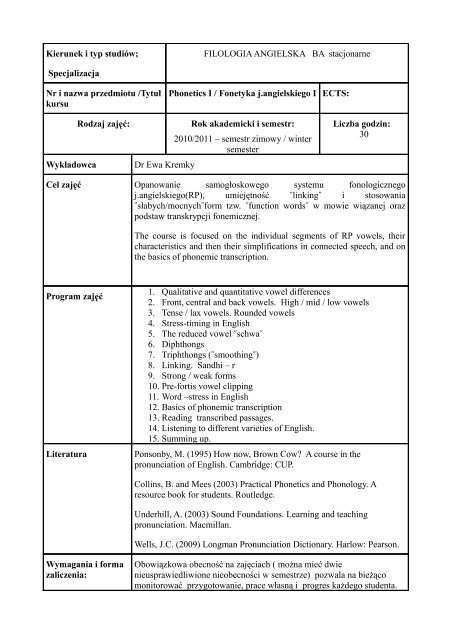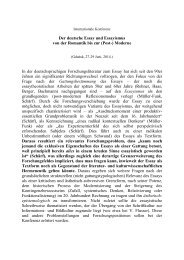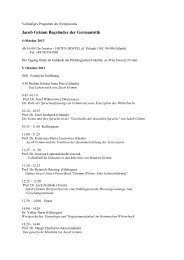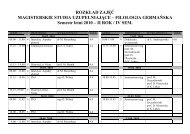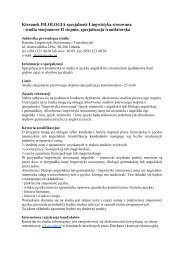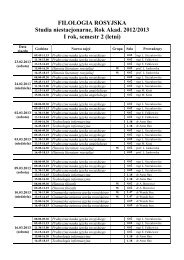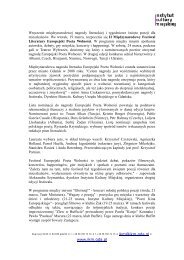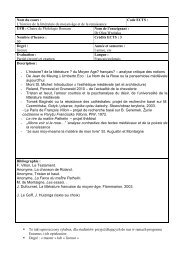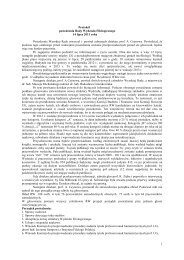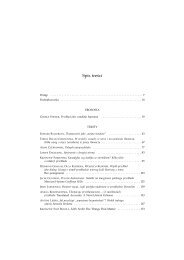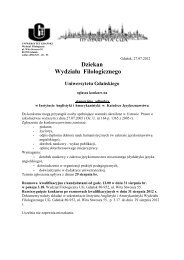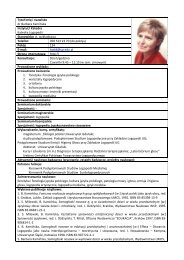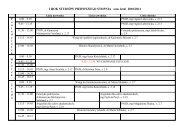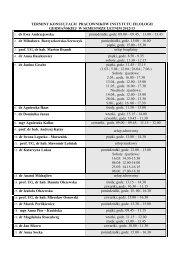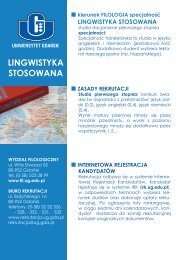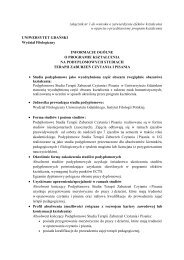Kierunek i typ studiów; Specjalizacja FILOLOGIA ANGIELSKA BA ...
Kierunek i typ studiów; Specjalizacja FILOLOGIA ANGIELSKA BA ...
Kierunek i typ studiów; Specjalizacja FILOLOGIA ANGIELSKA BA ...
You also want an ePaper? Increase the reach of your titles
YUMPU automatically turns print PDFs into web optimized ePapers that Google loves.
<strong>Kierunek</strong> i <strong>typ</strong> <strong>studiów</strong>;<br />
<strong>Specjalizacja</strong><br />
Nr i nazwa przedmiotu /Tytuł<br />
kursu<br />
<strong>FILOLOGIA</strong> <strong>ANGIELSKA</strong> <strong>BA</strong> stacjonarne<br />
Phonetics I / Fonetyka j.angielskiego I ECTS:<br />
Rodzaj zajęć: Rok akademicki i semestr:<br />
Wykładowca Dr Ewa Kremky<br />
2010/2011 – semestr zimowy / winter<br />
semester<br />
Liczba godzin:<br />
30<br />
Cel zajęć Opanowanie samogłoskowego systemu fonologicznego<br />
j.angielskiego(RP), umiejętność ˝linking˝ i stosowania<br />
˝słabych/mocnych˝form tzw. ˝function words˝ w mowie wiązanej oraz<br />
podstaw transkrypcji fonemicznej.<br />
Program zajęć<br />
The course is focused on the individual segments of RP vowels, their<br />
characteristics and then their simplifications in connected speech, and on<br />
the basics of phonemic transcription.<br />
1. Qualitative and quantitative vowel differences<br />
2. Front, central and back vowels. High / mid / low vowels<br />
3. Tense / lax vowels. Rounded vowels<br />
4. Stress-timing in English<br />
5. The reduced vowel ˝schwa˝<br />
6. Diphthongs<br />
7. Triphthongs (˝smoothing˝)<br />
8. Linking. Sandhi – r<br />
9. Strong / weak forms<br />
10. Pre-fortis vowel clipping<br />
11. Word –stress in English<br />
12. Basics of phonemic transcription<br />
13. Reading transcribed passages.<br />
14. Listening to different varieties of English.<br />
15. Summing up.<br />
Literatura Ponsonby, M. (1995) How now, Brown Cow? A course in the<br />
pronunciation of English. Cambridge: CUP.<br />
Wymagania i forma<br />
zaliczenia:<br />
Collins, B. and Mees (2003) Practical Phonetics and Phonology. A<br />
resource book for students. Routledge.<br />
Underhill, A. (2003) Sound Foundations. Learning and teaching<br />
pronunciation. Macmillan.<br />
Wells, J.C. (2009) Longman Pronunciation Dictionary. Harlow: Pearson.<br />
Obowiązkowa obecność na zajęciach ( można mieć dwie<br />
nieusprawiedliwione nieobecności w semestrze) pozwala na bieżąco<br />
monitorować przygotowanie, prace własną i progres każdego studenta.
Ocenie tej służą także dyktanda fonetyczne sprawdzające umiejętność<br />
dyskryminacji i identyfikacji fonemicznej i fonetycznej.<br />
These classes are compulsory and attendance at these will be carefully<br />
monitored (a student may miss two classes with no evidence required for<br />
the absences to be condoned).<br />
The course is assessed 100% by coursework.
<strong>Kierunek</strong> i <strong>typ</strong> <strong>studiów</strong>;<br />
<strong>Specjalizacja</strong><br />
Nr i nazwa przedmiotu<br />
/Tytuł kursu<br />
<strong>FILOLOGIA</strong> <strong>ANGIELSKA</strong> <strong>BA</strong> stacjonarne<br />
Gramatyka Opisowa I / Descriptive<br />
Grammar I<br />
Rodzaj zajęć: Rok akademicki i semestr:<br />
Wykładowca Dr Ewa Kremky<br />
2010/2011 – semestr zimowy / winter<br />
semester<br />
ECTS:<br />
Liczba godzin:<br />
30<br />
Cel zajęć Wprowadzenie w podstawy fonetyki i fonologii oraz rządzących w nich<br />
reguł. Opanowanie transkrypcji fonemicznej.<br />
Program zajęć<br />
The course is designed to demonstrate the relevance, value and challenge<br />
of phonetics and phonology.<br />
Introduction to the basics of phonemic transcription.<br />
Ćwiczenia / Classes<br />
The science of language<br />
The properties of language<br />
Phonetics vs phonology. Phonological description<br />
Phoneme and allophone<br />
Syllables. Phonotactics. Phonemic/phonetic transcription<br />
Overview. Test 1<br />
Test results – discussion<br />
Phonetics. Organs of speech and speech production<br />
Airstream mechanisms. Sonorants/obstruents<br />
English obstruents: place of articulation<br />
English obstruents: manner of articulation<br />
Coarticulation. Consonant allophony<br />
Polish/English consonants compared<br />
Overview. Test 2<br />
Test results – discussion. Summing up<br />
Literatura (No ˝directly out of the book ˝teaching.; no book completely covers the<br />
topics of the course)<br />
Pinker, S. (2007) The Language Instinct. New York: William Morrow &<br />
Company, Inc.<br />
Laver, J. (1995) Principles of Phonetics. Cambridge: CUP<br />
Giegerich, H.J. (1998) English Phonology: An Introduction. Cambridge:<br />
CUP.<br />
Gussman, E. (2007) The Phonology of Polish. Oxford: OUP.<br />
Jule, G. (2004) The study of language. Cambridge: CUP.<br />
Gimson, A.C. (1989) An Introduction to the Pronunciation of English.
Wymagania i forma<br />
zaliczenia:<br />
London: Edward Arnold.<br />
Ladefoged, P. (2000) A course in phonetics. Boston: Thomas Wadsworth.<br />
Roach, P. (2000) English Phonetics and Phonology. Cambridge: CUP.<br />
Wells, J.C. (2009) Longman Pronunciation Dictionary. Harlow: Longan.<br />
Lecumberri, M.I.G. and J.A. Maidment (2000) English Transcription<br />
Course. London: Hodder Arnold.<br />
Obowiązkowa obecność na zajęciach (dopuszczalne dwie<br />
nieusprawiedliwione nieobecności w semestrze).<br />
Zaliczenie z oceną na podstawie wyników z 2 testów ( Tydzień 6 i<br />
Tydzień14) – 70% oraz przygotowania i aktywności na zajęciach – 30%.<br />
DG I class is obligatory ( two unexcused absences a semester are<br />
allowed). The course is assessed 70% by the two tests (Week 6 and Week<br />
14) and 30% by coursework.
<strong>Kierunek</strong> i <strong>typ</strong> <strong>studiów</strong>;<br />
<strong>Specjalizacja</strong><br />
Nr i nazwa przedmiotu /Tytuł<br />
kursu<br />
Rodzaj zajęć:<br />
ćwiczenia<br />
ANGLISTYKA 1 STOPNIA DZIENNE, SPECJALIZACJA<br />
NAUCZYCIELSKA<br />
KURS ZINTEGROWANY<br />
(INTEGRATED SKILLS)<br />
1ST YEAR <strong>BA</strong><br />
Wykładowca dr Beata Karpińska-Musiał<br />
Cel zajęć<br />
Program zajęć<br />
Literatura<br />
Rok akademicki i semestr:<br />
2010/2011, semestr zimowy/letni<br />
ECTS:<br />
Liczba godzin:<br />
60<br />
1 st year <strong>BA</strong> Integrated Skills course is aimed at simultaneous and synchronized<br />
developing of all the four language skills: speaking, reading, listening and<br />
writing. However, the main focus shall be directed towards training the<br />
practical skills of reading with comprehension, applying extensive vocabulary<br />
in conversation and reviewing rules of grammar (English in Use) in a form of<br />
tests, transformations and other practical exercises.<br />
Each skill shall be trained in a form of examination tasks, which are for a<br />
particular language skill as follows:<br />
Reading: ex. multiple matching (matching prompts from a list to different parts<br />
of a text), multiple choice (comprehension questions or finishing sentences),<br />
gapped texts (completing gaps in a text with a chosen fragment/paragraph)<br />
English In Use: ex. multiple choice cloze tests (completing gaps with a proper<br />
word/form of a word – focus on vocabulary), open cloze tests (completing gaps<br />
with a proper expression/word – focus on grammar), error correction tests (to<br />
find a mistake/error), word formation exercises (given a stem, make a proper<br />
form), transformations (rewriting in a different form).<br />
Listening: 4 parts: 1- listening to a monologue and taking notes or completing<br />
sentences, 2-a monologue but heard once only, 3-a conversation, after which<br />
multiple choice questions must be answered, 4-five short, related thematically<br />
extracts of about 30 seconds each for multiple matching or multiple choice<br />
questions.<br />
Speaking: lots of different forms, not only exam-like: interviews, debates,<br />
talking in pairs or groups, but also relating on prompt pictures or retelling<br />
stories. Your imagination and initiative required!!!<br />
Occasionally, additional materials for speaking, vocabulary practice or<br />
grammatical transformations may be provided by the teacher. Thematic<br />
vocabulary from Wordbuilder may be adapted. Students’ own experience,<br />
ideas and active participation will be highly expected and appreciated.<br />
The course will generally follow one of the latest course-books: CAE Gold<br />
Plus, which prepares learners for Cambridge Certificate in Advanced English.<br />
Thus, the level of grammar and vocabulary tasks is supposed to lead the<br />
students to the completion of an advanced level, and their form is that of<br />
Certificate of Advanced English. The course is planned to prepare the students<br />
gradually to climb up to proficiency level in the next two years of <strong>BA</strong> studies.
Wymagania i forma<br />
zaliczenia:<br />
CAE Gold Plus Coursebook by Kenny, N, Newbrook, J & Acklam,R.<br />
Publisher: Longman 2008<br />
Guy Wellman, The Heinemann ELT English Wordbuilder, Macmillan Publishers<br />
1998<br />
Tests in English. Thematic vocabulary, M. Misztal. WSiP 1995<br />
Tests in English. Structural conversion, M. Misztal. WSiP 1996<br />
Requirements for a passing grade:<br />
Attendance: 2 unexcused absences allowed in a semester<br />
Active participation in class discussions and workgroup/pairwork<br />
Every second or third unit there will be a short review/progress test – at least 2<br />
in a semester – all must be passed<br />
By the end of each semester there will be one mock CAE examination – they<br />
must be passed in order to get a passing grade.<br />
At the end of a course: written examination consisting of 2 parts: Listening<br />
Comprehension Test and a written test: ca. 6 tasks of different sort: for<br />
vocabulary, grammar, reading comprehension.
<strong>Kierunek</strong> i <strong>typ</strong> <strong>studiów</strong>;<br />
<strong>Specjalizacja</strong><br />
Nr i nazwa przedmiotu /Tytuł<br />
kursu<br />
Rodzaj zajęć:<br />
Ćwiczenia<br />
Filologia – anglistyka (specjalność nauczycielska i<br />
translatoryka) oraz amerykanistyka, studia I stopnia,<br />
stacjonarne<br />
Kultura brytyjska / British culture<br />
(22 – naucz.)<br />
(7 – trans.)<br />
(9 – amer.)<br />
Rok akademicki i semestr:<br />
2010/2011 semestr II<br />
Wykładowca Tadeusz Z. Wolański M.A. (Cantab.), P.G.C.E.<br />
ECTS: 2<br />
Liczba godzin:<br />
Cel zajęć Students are to become acquainted with British culture, learn how to use<br />
sources and prepare a presentation.<br />
Program zajęć<br />
Literatura<br />
Wymagania i forma<br />
zaliczenia:<br />
Studenci mają zapoznać się z szeroko pojętą kulturą brytyjską, nauczyć<br />
się korzystać z źródeł i przygotować prezentację.<br />
Introduction<br />
The Physical and Human Geography of England<br />
The Physical and Human Geography of Scotland<br />
The Physical and Human Geography of Wales<br />
The Physical and Human Geography of Northern Ireland<br />
London<br />
The British Monarchy<br />
The Education System<br />
Theatre<br />
Films<br />
The Music Scene<br />
Pubs<br />
Miscellanea<br />
Conclusion<br />
Media brytyjskie (prasa, telewizja, radio, kino, teatr)<br />
Publikacje o kulturze brytyjskiej, historii, historii społecznej i geografii<br />
British media (press, television, radio, cinema, theatre)<br />
Publications about British culture, history, social history and geography<br />
OBTAINING COURSE CREDITS<br />
Attendance at all classes (possibility of two unexcused absences in the<br />
semester).<br />
Active participation in all classes.<br />
Thorough preparation for all classes.<br />
Appropriate level of spoken English in all of its aspects (e.g. phonetics,<br />
fluency, grammar, vocabulary etc.).<br />
If the above conditions are not met, students will be obliged to take an<br />
oral examination covering all the material from the course.<br />
Credit with a grade on the basis of continuous assessment.<br />
ZASADY ZALICZANIA<br />
Obecność na wszystkich zajęciach (ewentualnie dwie<br />
30
nieusprawiedliwione nieobecności w semestrze).<br />
Czynny udział we wszystkich zajęciach.<br />
Rzetelne przygotowanie się do wszystkich zajęć.<br />
Odpowiedni poziom języka mówionego we wszystkich aspektach (np.<br />
fonetyka, płynność, gramatyka, leksyka itp.).<br />
Jeżeli powyższe warunki nie będą spełnione, może być wymagane zdanie<br />
t.zw. „zbója” przed zaliczeniem kursu.<br />
Zaliczenie na ocenę na podstawie aktywności podczas kursu.<br />
Tadeusz Z. Wolański
<strong>Kierunek</strong> i <strong>typ</strong> <strong>studiów</strong>;<br />
<strong>Specjalizacja</strong><br />
Nr i nazwa przedmiotu /Tytuł<br />
kursu<br />
Rodzaj zajęć:<br />
Ćwiczenia<br />
Filologia – anglistyka (specjalność nauczycielska i<br />
translatoryka) oraz amerykanistyka, studia I stopnia,<br />
stacjonarne i niestacjonarne<br />
Historia Anglii / British history<br />
(6 – naucz.)<br />
(6 – trans.)<br />
(8 – amer.)<br />
(5 – niestac.)<br />
Rok akademicki i semestr:<br />
2010/2011 semestr I<br />
Wykładowca Tadeusz Z. Wolański M.A. (Cantab.), P.G.C.E.<br />
ECTS:<br />
(4 - naucz.)<br />
(2 – trans.)<br />
(5 - amer.)<br />
(4 – niestac.)<br />
Liczba godzin:<br />
Cel zajęć Students are to become acquainted with the history of England and Great<br />
Britain from the time of the first Roman invasion (55 BC) to the present<br />
day, learn how to use sources and prepare a presentation.<br />
Program zajęć<br />
Literatura<br />
Studenci mają zapoznać się z historią Anglii i Wielkiej Brytanii od<br />
czasów pierwszej inwazji Juliusza Cesarza (55 p.n.e.) do dnia<br />
dzisiejszego, nauczyć się korzystać z źródeł i przygotować prezentację.<br />
The Romans<br />
The Anglo-Saxons<br />
The Normans<br />
The Plantagenets<br />
The Hundred Years’ War and the Wars of the Roses<br />
The Tudors<br />
The seventeenth century<br />
The eighteenth century<br />
The nineteenth century<br />
The twentieth and twenty-first centuries<br />
Students are expected to focus on the following subjects in each of the<br />
above-mentioned periods:<br />
History<br />
Geography<br />
Culture<br />
Science and technology<br />
Transport and communications<br />
Architecture and urbanisation<br />
Agriculture<br />
Trade and economy<br />
Outstanding figures<br />
Language<br />
Dzieje Anglii – Kędzierski<br />
Historia Anglii – Zins<br />
Oxford Illustrated History of Britain – Kenneth O. Morgan (ed.)<br />
30
Wymagania i forma<br />
zaliczenia:<br />
Longman History of the USA – Hugh Brogan (American Studies only)<br />
The internet<br />
OBTAINING COURSE CREDITS<br />
Attendance at all classes (possibility of two unexcused absences in the<br />
semester)<br />
Active participation in all classes<br />
Thorough preparation for all classes<br />
Appropriate level of spoken English in all of its aspects (e.g. phonetics,<br />
fluency, grammar, vocabulary etc.)<br />
If the above conditions are not met, students will be obliged to take an<br />
oral examination covering all the material from the course<br />
The semester ends with a multiple-choice examination (on obtaining the<br />
credit) consisting of one hundred questions (American Studies and<br />
Translation students will have a different examination based on the series<br />
of lectures)<br />
ZASADY ZALICZANIA<br />
Obecność na wszystkich zajęciach (ewentualnie dwie<br />
nieusprawiedliwione nieobecności w semestrze).<br />
Czynny udział we wszystkich zajęciach.<br />
Rzetelne przygotowanie się do wszystkich zajęć.<br />
Odpowiedni poziom języka mówionego we wszystkich aspektach (np.<br />
fonetyka, płynność, gramatyka, leksyka itp.).<br />
Jeżeli powyższe warunki nie będą spełnione, może być wymagane zdanie<br />
t.zw. „zbója” przed zaliczeniem kursu.<br />
Semestr kończy się egzaminem pisemnym (po uzyskaniu zaliczenia).<br />
Egzamin pisemny będzie miał formę testu <strong>typ</strong>u „multiple choice”,<br />
składający się ze stu pytań (na Amerykanistyce i Translatoryce egzamin w<br />
innej formie na podstawie wykładów).<br />
Tadeusz Z. Wolański
<strong>Kierunek</strong> i <strong>typ</strong> <strong>studiów</strong>;<br />
<strong>Specjalizacja</strong><br />
Nr i nazwa<br />
przedmiotu /Tytuł kursu<br />
Rodzaj zajęć:<br />
ćwiczenia/classes<br />
Wykładowca mgr. Jennfier Zielińska<br />
<strong>FILOLOGIA</strong> <strong>ANGIELSKA</strong> I <strong>BA</strong> stacjonarne<br />
Amerykanistyka<br />
Fonetyka/ Phonetics – American<br />
Voices<br />
Rok akademicki i semestr:<br />
2010-2011 – semestr zimowy / winter<br />
semester<br />
ECTS:<br />
15/4<br />
Liczba godzin:<br />
30<br />
Cel zajęć Predstawienie głównych aspektów amerykańskiego mówionego.<br />
Studenci zaponają się z materiałami autentycznymi. Praca na<br />
ćwiczeniach nad głównymi problemi fonetycznymi polskich<br />
studentów.<br />
Program zajęć<br />
This is a course in spoken American English. It is not a course in<br />
conversation, vocabulary, or phonetic transcription. While we will<br />
use conversation, vocabulary, and some phonetic transcription, the<br />
focus of our work will be on the intonation and the liaisons that<br />
mark speakers as American, regardless of any regional accent they<br />
might have.<br />
Since all humans learn to speak by mimicking those around<br />
them, we will attempt to do the same while working with a variety<br />
of American voices, or accents. These will be drawn mainly from the<br />
Internet, which is a great source of the sounds of American English,<br />
but we will also use films, songs, spoken word texts, and exercises.<br />
We will work in class with a range of pronunciation issues that<br />
Polish speakers of English <strong>typ</strong>ically have.<br />
Main Vowel Sounds of American English<br />
Voiceless and Voiced Consonants<br />
Stops and Continuants<br />
t-sounds in American English<br />
Literatura http://www.americanrhetoric.com/<br />
Wymagania i<br />
forma<br />
zaliczenia:<br />
http://poets.org/<br />
Mastering the American Accent, ed. Lisa Mojsin (New York,<br />
2009)<br />
Pronouncing American English, 2 nd edition, ed. Gertrude F.<br />
Orion (Pacific Grove, 1997)<br />
Obecność na zajęciach jest obowiązkowa. Ocena zalęzy od<br />
aktywnego udziału na zajęciach (75%), oceny pracy na końcu I<br />
semestru (10%) oraz oceny pracy na końcu II semestru (15%).<br />
I will take attendance at the beginning of every class, and it is
essential that you are here. You are allowed one unexcused absence<br />
per semester. Each subsequent unexcused absence will result in your<br />
grade being lowered by one half.<br />
Your grade will depend primarily on your participation in class<br />
(75%). There will also be a project at the end of the first semester<br />
(10%), and a final project (15%) at the end of the second semester.<br />
By participation I mean that you are present, prepared, and willing to<br />
work with others and to make contributions. The projects at the end<br />
of the first and second semesters will be done in pairs or groups of<br />
three. You will be given a list of “difficult” words which will be the<br />
basis for a short spoken piece that you will write and them perform<br />
as a pair or group in front of the class. These projects will be<br />
scheduled for the last one or two sessions of each semester.<br />
One last note...English (not Polish) is the language we speak in this<br />
class. You speak English (not Polish) to me and to each other at all<br />
times.
<strong>Kierunek</strong> i <strong>typ</strong> <strong>studiów</strong>;<br />
<strong>Specjalizacja</strong><br />
Nr i nazwa<br />
przedmiotu /Tytuł kursu<br />
Rodzaj zajęć:<br />
Ćwiczenia/classes<br />
Filologia angielska I <strong>BA</strong>, studia stacjonarne<br />
Nauczycielska / Teaching<br />
Wykładowca dr Agnieszka Żukowska<br />
Historia literatury angielskiej /<br />
History of English Literature<br />
Rok akademicki i semestr:<br />
2010/2011 – semestr letni / summer<br />
semester<br />
ECTS:<br />
Liczba godzin:<br />
30<br />
Cel zajęć Celem zajęć jest zapoznanie studentów z wybranymi dziełami<br />
angielskiej literatury epoki renesansu. W trakcie kursu studenci<br />
rozwiną umiejętność analizy dzieł literackich z uwzględnieniem<br />
kontekstu kulturowego.<br />
Program zajęć<br />
Literatura<br />
Wymagania i<br />
forma<br />
zaliczenia:<br />
The aim of the course is to introduce students to a selection of<br />
literary works of the English Renaissance. The material discussed<br />
will be set in its cultural context. As part of the course, students will<br />
develop their skills in textual analysis.<br />
Przedmiot analizy stanowić będą wybrane utwory reprezentatywne<br />
dla szeroko pojętej epoki angielskiego renesansu, w tym: pieśni<br />
(Campion), sonety (Wyatt, Howard, Sidney, Spenser, Shakespeare),<br />
dramaty (Kyd, Marlowe, Shakespeare, Webster, Jonson) oraz poezja<br />
metafizyczna.<br />
The material to be discussed includes a selection of literary works of<br />
the English Renaissance: ayres (Campion), sonnets (Wyatt, Howard,<br />
Sidney, Spenser, Shakespeare), drama (Kyd, Marlowe, Shakespeare,<br />
Webster, Jonson) and metaphysical poetry.<br />
The Cambridge Companion to English Renaissance Drama, ed. A.<br />
R. Braunmuller and M. Hattaway, Cambridge: Cambridge<br />
University Press, 1990.<br />
R. Carter, The Routledge History of Literature in English: Britain<br />
and Ireland, London: Routledge, 1997.<br />
D. Daiches, A Critical History of English Literature, London: Secker<br />
and Warburg, 1975.<br />
zaliczenie testu semestralnego (test złożony z pytań dotyczących<br />
zagadnień omawianych na ćwiczeniach)<br />
złożenie kilku krótkich prac pisemnych (analiza wiersza,<br />
fragmentu sztuki, itp.)<br />
obecność oraz aktywny udział w zajęciach<br />
a test at the end of the semester (questions based on the material<br />
discussed in class)<br />
short written assignments (e.g. poetry and drama analysis)<br />
attendance and active participation in classes
<strong>Kierunek</strong> i <strong>typ</strong> <strong>studiów</strong>;<br />
<strong>Specjalizacja</strong><br />
Nr i nazwa<br />
przedmiotu /Tytuł kursu<br />
Rodzaj zajęć:<br />
Ćwiczenia/classes<br />
Wykładowca dr Agnieszka Żukowska<br />
Amerykanistyka I <strong>BA</strong>, studia stacjonarne<br />
American Studies<br />
Historia literatury angielskiej /<br />
History of English Literature<br />
Rok akademicki i semestr:<br />
2010/2011 – semestr zimowy i letni /<br />
winter and summer semester<br />
ECTS:<br />
Liczba godzin:<br />
30/30<br />
Cel zajęć Celem zajęć jest zapoznanie studentów z wybranymi dziełami<br />
literatury angielskiej powstałymi w okresie od średniowiecza do<br />
epoki wiktoriańskiej. W trakcie kursu studenci rozwiną umiejętność<br />
analizy dzieł literackich z uwzględnieniem kontekstu kulturowego.<br />
Program zajęć<br />
Literatura<br />
Wymagania i<br />
forma<br />
zaliczenia:<br />
The aim of the course is to introduce students to a selection of works<br />
of English literature created in the period spanning from the Middle<br />
Ages to the Victorian age. The material discussed will be set in its<br />
cultural and literary context. As part of the course, students will<br />
develop their skills in textual analysis.<br />
Przedmiot analizy stanowić będą wybrane utwory z zakresu:<br />
literatury staroangielskiej (epos, elegia, poezja religijna),<br />
późnośredniowiecznej (romans, poezja narracyjna, moralitet),<br />
dramatu oraz poezji renesansowej, poezji barokowej, dramatu oraz<br />
poezji okresu Restauracji, osiemnastowiecznej twórczości<br />
poetyckiej oraz powieściopisarskiej, poezji oraz prozy romantycznej<br />
i wiktoriańskiej.<br />
The material to be analysed is a selection of the following: Old<br />
English literature (epic, elegy, religious poetry), Middle English<br />
literature (romance, narrative poetry, morality play), Renaissance<br />
drama and poetry, Baroque poetry, drama and poetry of the<br />
Restoration, eighteenth-century poetry and novels, poetry and prose<br />
of the Romanticism and of the Victorian age.<br />
D. Daiches, A Critical History of English Literature, London: Secker<br />
and Warburg, 1975.<br />
R. Carter, The Routledge History of Literature in English: Britain<br />
and Ireland, London: Routledge, 1997.<br />
zaliczenie 2 testów semestralnych (test złożony z pytań<br />
dotyczących zagadnień omawianych na ćwiczeniach)<br />
złożenie kilku krótkich prac pisemnych (analiza wiersza,<br />
fragmentu sztuki, itp.)<br />
obecność i aktywny udział w zajęciach /<br />
a test at the end of each semester (questions based on the material<br />
discussed in class)<br />
short written assignments (e.g. poetry and drama analysis)<br />
attendance and active participation in classes
<strong>Kierunek</strong> i <strong>typ</strong> <strong>studiów</strong>;<br />
<strong>Specjalizacja</strong><br />
Filologia angielska stacjonarna II stopnia: językoznawstwo<br />
Weekday Graduate English Studies: Linguistics<br />
Nr i nazwa przedmiotu 1 KZ: ESP / Integrated Skills: ESP<br />
Rodzaj zajęć:<br />
audytoryjne<br />
Wykładowca mgr Maciej Rataj<br />
Cel zajęć<br />
Program zajęć<br />
Literatura<br />
Wymagania i<br />
forma<br />
zaliczenia:<br />
Business English<br />
Rok akademicki i semestr:<br />
Rok I sem. 1 / year 1 term 1<br />
ECTS: 18 (cały<br />
kurs)<br />
Liczba godzin:<br />
30<br />
Zapoznanie studentów z podstawami języka angielskiego w biznesie. / The aim of<br />
the course is to familiarise the students with the basics of Business English.<br />
1. New business: self-financing, questions in presentations, executive summaries;<br />
2. Financial control: accounting, financial documents, meetings, minutes;<br />
3. Fair trade: contracts and ethics, negotiations, assertive writing;<br />
4. A sample Cambridge BEC Higher test (fragments);<br />
5. Making a start: kick-off meetings, agendas;<br />
6. Sales talk: sales-related vocabulary;<br />
7. Newspaper articles: the credit crunch and recession;<br />
8. Commercial correspondence: enquiries;<br />
9. Business English idioms;<br />
10. Miscellaneous exercises and articles.<br />
Allison, John, Townend, Jeremy and Paul Emmerson. 2008. The Business: Upper-<br />
Intermediate Student’s Book. Oxford: Macmillan.<br />
Ashley, A. 2003. Oxford Handbook of Commercial Correspondence. Oxford:<br />
OUP.<br />
BEC Higher sample paper. Cambridge ESOL. Website. Accessed Sept. 2010.<br />
http://www.cambridgeesol.org/resources/teacher/bec.html<br />
Learn English Today. Website. Accessed Sept. 2010. www.learn-englishtoday.com<br />
One Stop English. Website. Accessed Sept. 2010. www.onestopenglish.com<br />
1. Wymagana jest obecność na zajęciach oraz aktywne uczestnictwo. Można mieć<br />
dwie nieusprawiedliwione nieobecności w semestrze. Należy przedstawiać<br />
zwolnienia lekarskie i, w przypadku nieobecności na teście, napisać test tuż po<br />
powrocie na zajęcia. 2. Kurs nie wymaga wiedzy z zakresu ekonomii. W razie<br />
niezrozumienia tematu należy wpierw samodzielnie poszukać informacji zamiast<br />
zwracać się od razu do prowadzącego. 3. W semestrze są dwa testy, na których<br />
będą zadania na słownictwo I rozumienie tekstu. Nie można ich poprawiać. 4.<br />
Ćwiczenia z tłumaczeń zależeć będą od obecności na kursie studentów z<br />
zagranicy. 5. By zaliczyć kurs, należy otrzymać średnią przekraczającą 2,9. W<br />
przeciwnym razie należy napisać test na zaliczenie na początku drugiego<br />
semestru. 6. W razie zmian w sylabusie jego aktualna wersja zostanie<br />
udostępniona. Zaliczeniem jest ocena na koniec semestru.<br />
1. Attendance and active participation are compulsory. You may miss two classes<br />
without a valid excuse. In case you miss a class you are expected to present an<br />
excuse written by a physician as soon as you return. In case you are absent from a<br />
test you are required to take it as soon as you return to my class.<br />
2. The course presupposes little knowledge of economics and business as well as<br />
little knowledge of Business English vocabulary. NB This is not a course in<br />
business or economics. If you fail to understand the topic despite having looked<br />
up the necessary vocabulary you are expected to search for the answers to your
questions on your own before asking the teacher for additional information.<br />
3. There will be two tests throughout the term. The tasks will probably include but<br />
will not be limited to the following: reading comprehension, open gap filling,<br />
multiple choice gap filling, sentence transformation with revealed<br />
fragments/keywords. The tests may not be retaken.<br />
4. If all the students are native or otherwise proficient speakers of Polish the<br />
classes and the tests may include translation exercises.<br />
5. In order to complete this course you need to obtain satisfactory grades in both<br />
tests so that the grade average exceeds 2.9. Failure to do so results in the<br />
obligation to do a course retake (a large test) at the beginning of the second term.<br />
6. Should the syllabus be modified during the term an updated version will be<br />
made available to you.<br />
Grades will be given at the end of the term.
<strong>Kierunek</strong> i <strong>typ</strong> <strong>studiów</strong>;<br />
<strong>Specjalizacja</strong><br />
Nr i nazwa<br />
przedmiotu /Tytuł kursu<br />
Np.: <strong>FILOLOGIA</strong> <strong>ANGIELSKA</strong> <strong>BA</strong> stacjonarne<br />
Język pisany<br />
Written English<br />
Translatoryka<br />
ECTS:<br />
Rodzaj zajęć: Rok akademicki i semestr: 1 Liczba godzin:<br />
30<br />
Wykładowca mgr Aleksandra Arceusz<br />
Cel zajęć<br />
Program zajęć<br />
Literatura<br />
Wymagania i<br />
forma<br />
zaliczenia:<br />
Rozwijanie umiejętności pisania w języku angielskim<br />
Zapoznanie studentów ze zasadami konstruowania wypowiedzi pisemnych<br />
Wyeliminowanie wpływów języka ojczystego<br />
Zapoznanie studentów z zasadami interpunkcji w języku angielskim<br />
To provide students with opportunities to develop their writing skills in<br />
English<br />
To familiarize students with the specific construction of paragraphs in<br />
English<br />
To eliminate Polish interference in creating sentences and paragraphs<br />
To familiarize students with rules of British punctuation<br />
Budowa wypowiedzi pisemnej<br />
Techniki brainstorming’u<br />
Budowa zdań złożonych i paragrafów w jęz. angielskim<br />
Pisanie na temat<br />
Interpunkcja<br />
Duża forma – opisy ludzi, miejsc, zdarzeń i dzieł sztuki<br />
Layout of work (paragraphing; indentation/block style; margins etc.)<br />
Brainstorming techniques.<br />
From sentence to paragraph to essay:<br />
Sentences<br />
Paragraphs<br />
Description essays<br />
Writing to the point<br />
Punctuation, with specific reference to differences between Polish and<br />
English punctuation.<br />
Cowan, E. (1983) Writing. Brief Edition. Scott, Foresman and Co.<br />
Evans, V. (1997) Successful Writing Proficiency. Express Publishing.<br />
Hamp-Lyons, L. and B. Heasley (1987) Study Writing. CUP.<br />
Langan, J. (1997) College Writing Skills with Readings. McGraw-Hill.<br />
Macpherson, R. (1994) University English. Wydawnictwa Szkolne i<br />
Pedagogiczne.<br />
Macpherson, R. (2001) Advanced Written English. PWN.<br />
Leggett, G.M. et. al, (1965) Prentice Hall Handbook for Writers. Prentice<br />
Hall.<br />
Robinson, H.T. and L. Modrey (1986) Active Writing. Macmillan.<br />
Obecność na zajęciach obowiązkowa, student ma prawo do dwóch<br />
nieobecności w semestrze bez negatywnych konsekwencji. Wszystkie<br />
prace (3 w semestrze) muszą być oddane na czas i zaliczone. Student ma<br />
prawo do poprawy pracy ocenionej negatywnie w ciągu dwóch tygodni od<br />
uzyskania oceny niedostatecznej.
To get credit for the course, students are obliged to attend the classes.<br />
Students can miss two classes in a semester without any negative<br />
consequences, providing they will hand in all necessary written<br />
assignments.<br />
Students’ written work will be assessed at least three times during the<br />
semester. Each student has the right to correct their work once, within two<br />
weeks of getting a failing grade.
<strong>Kierunek</strong> i <strong>typ</strong> <strong>studiów</strong>;<br />
<strong>Specjalizacja</strong><br />
Nr i nazwa<br />
przedmiotu /Tytuł kursu<br />
<strong>FILOLOGIA</strong> <strong>ANGIELSKA</strong> I <strong>BA</strong> stacjonarne<br />
Translatoryka/Translation Studies<br />
Historia literatury angielskiej/English<br />
Literary History<br />
Rodzaj zajęć: Rok akademicki i semestr:<br />
Wykładowca Prof. dr hab. Artur Blaim<br />
2010-2011 - semestr zimowy/ winter<br />
semester<br />
ECTS:<br />
Liczba godzin:<br />
30<br />
Cel zajęć Zajęcia mają na celu zapoznanie studentów z kluczowymi tekstami<br />
literatury angielskiej, ich usytuowaniu w kontekście<br />
historycznoliterackim i kulturze współczesnej, oraz podstawowymi<br />
metodami analizy tekstu.<br />
Program zajęć<br />
Literatura<br />
Students will study some of the key works from English medieval<br />
and Renaissance literature and their place in literary history and<br />
contemporary culture. They will also become acquainted with basic<br />
concepts and methods of literary analysis.<br />
Beowulf<br />
Geoffrey Chaucer – Canterbury Tales (selections)<br />
William Shakespeare – Henry IV<br />
William Shakespeare - Midsummer Night’s Dream<br />
William Shakespeare – King Lear<br />
William Shakespeare - Hamlet<br />
William Shakespeare – Measure for Measure<br />
William Shakespeare - The Merchant of Venice<br />
William Shakespeare - The Tempest<br />
John Milton – Paradise Lost<br />
Thomas More - Utopia<br />
Dodatkowa lista filmów/Additional viewing list<br />
Pier Paolo Pasolini, dir. – Canterbury Tales<br />
Orson Welles, dir. – Falstaff<br />
Michael Hoffman, dir. – Midsummer Night’s Dream<br />
Grigori Kozintsev, dir. – King Lear<br />
Peter Brook, dir. – King Lear<br />
Akira Kurosawa, dir - Ran<br />
Bob Komar, dir. – Measure for Measure<br />
Peter Greenaway, dir. – Prospero’s Books<br />
Michael Alexander - A History of English Literature, London:<br />
Macmillan 2000.<br />
Ronald Carter & John McRae, The Routledge History of Literature<br />
in English, London: Routledge 1997.
Wymagania i<br />
forma<br />
zaliczenia:<br />
Andrzej Zgorzelski, Lectures on British Literature, Lublin:<br />
WSSP 2008.<br />
Harold Bloom, ed. Geoffrey Chaucer’s Canterbury Tales, New<br />
York: Bloom’s Literary Criticism, 2008<br />
Elsa Sjoberg, From Madcap Prince to King: The Evolution of Prince<br />
Hal, Shakespeare Quarterly XX (1961), 33-46.<br />
Hugh Dickinson, The Reformation of Prince Hal, Shakespeare<br />
Quarterly XII (1961), 33-46.<br />
Julia Reinhard Lupton, Creature Caliban, Shakespeare Quarterly<br />
Vol. 51 (2000), 1-23.<br />
Dean Ebner, The Tempest: Rebellion and the Ideal State,<br />
Shakespeare Quarterly, Vol. 16 (1965), 161-173<br />
James Calderwood, “Hamlet. The Name of Action,” Modern<br />
Language Quarterly Vol. 39 (1978), 331-362.<br />
William Dodd, Impossible Worlds: What Happens in King Lear, Act<br />
1, Scene 1?, Shakespeare Quarterly, Vol. 50 (1999), 477-507.<br />
D.M. Cohen, The Jew and Shylock, Shakespeare Quarterly, Vol. 31<br />
(1980), 53-63.<br />
James L. Calderwood – Creative Uncreation in King Lear,<br />
Shakespeare Quarterly XXXVII (1986), 5-19.<br />
Fredson Bowers, The Structure of King Lear, Shakespeare Quarterly<br />
XXXI (1980), 7-20.<br />
Herbert Bronstein, Shakespeare, the Jews and The Merchant of<br />
Venice, Shakespeare Quarterly, XX (1969), 3-10.<br />
Phyllis Rackin, Delusion and Resolution in King Lear, Shakespeare<br />
Quarterly, XXI (1970), p. 29-34.<br />
Artur Blaim, “More’s Utopia: Persuasion or Polyphony?”, Moreana<br />
XIX (1982), p. 5-20.<br />
Pam Morris, ed. The Bakhtin Reader, London: Arnold, 1994.<br />
Aktywne uczestnictwo w zajęciach. 2. Ustna prezentacja na zadany<br />
temat (1). 3. Egzamin – 10 otwartych pytań z złożony z 10<br />
otwartych pytań dotyczący zagadnień omawianych na ćwiczeniach i<br />
samodzielnej lektury opracowań/1. Regular attendance and active<br />
participation in class activities 2. One oral presentation. 3. Takehome<br />
exam: ten open questions relating to discussions in class and<br />
reading list.
<strong>Kierunek</strong> i <strong>typ</strong> <strong>studiów</strong>;<br />
<strong>Specjalizacja</strong><br />
Nr i nazwa<br />
przedmiotu /Tytuł kursu<br />
<strong>FILOLOGIA</strong> <strong>ANGIELSKA</strong> I <strong>BA</strong> (gr. A,B,C), stacjonarne<br />
Kultura amerykańska<br />
American Culture/<br />
Amerykanistyka/American Studies<br />
Cultural Reflections: American Reality<br />
In American Art<br />
Rodzaj zajęć: Rok akademicki i semestr:<br />
2010-2011 – semestr zimowy /<br />
winter semester<br />
Wykładowca Dr Małgorzata Lisiewicz<br />
Liczba godzin:<br />
30+30+30<br />
Cel zajęć Zajęcia poświęcone są analizie sztuki amerykańskiej z punktu<br />
widzenia sposobów, w jakich rzeczywistość amerykańska<br />
znajdowała swoje odzwierciedlenie w praktyce artystycznej.<br />
Celem zajęć jest spojrzenie na sztukę jako na aktywnego<br />
uczestnika procesów tworzących amerykańską tradycję i<br />
amerykański postęp. Mają one zachęcić do badania zarówno<br />
formy, jak i treści przedstawień jako źródła złożonych narracji o<br />
marzeniach i ideałach amerykańskiego społeczeństwa, ale także<br />
o ich codziennym życiu.<br />
Program zajęć<br />
The course is devoted to analyses of artistic practices from the point<br />
of view of the ways American reality found its expression in socalled<br />
‘high’ art production. The objective of the course is to<br />
examine art as an active participant in the process of constructing<br />
the American tradition and American progress. It proposes to<br />
interpret artistic form and content as a source of a complex<br />
narrative about American dreams and ideals, but also daily<br />
American life.<br />
Przedmiotem analiz w pierwszym semestrze będzie sztuka<br />
Stanów Zjednoczonych od drugiej połowy XVIII wieku do<br />
pierwszych dekad XX wieku. Omawiane będą m.in. następujące<br />
kierunki i tendencje: Klasycyzm okresu kolonialnego,<br />
amerykański romantyzm, impresjonizm, awangarda, realizm<br />
drugiej połowy XIX wieku, oraz pierwszej połowy XX wieku.<br />
The course in the first semester offers a survey of the development<br />
of visual arts in the United States from the second half of 18 th<br />
century till the first half of the 20 th century, including Colonial<br />
Classicism, American Romanticism, Realism, Impressionism, Avant-<br />
Garde, and American Scene Painting movement.<br />
Literatura Frances K. Pohl, Framing America. A Social History of American<br />
Art, [Thames&Hudson; NY, 2002]<br />
Barbara Novak, American painting of the Nineteenth Century.
Wymagania i<br />
forma<br />
zaliczenia:<br />
Realism, Idealism, and the American Experience, second edition,<br />
{Harper&Row; NY, 1979]<br />
David E.Shi, Facing Facts. Realism in American Thought and<br />
Culture 1850-1920, [Oxford University Press; USA, 1996]<br />
Griselda Pollock, Mary Cassat. Painter of Modern Women,<br />
[Thames&Hudson; London, 1998]<br />
H. Barbara Weinberg, Doreen Bolger, David Park Curry, American<br />
Impressionism and Realism. The Painting of Modern Life, 1885-<br />
1915, [The Metropolitan Museum of Art; New York, 1994]<br />
Karen Lucic, Charles Sheeler and the Cult of the Machine, [Harvard<br />
University Press; Cambridge, Massachusetts, 1991]<br />
Silvia Borghesi, Hopper, [Rzeczpospolita; Warszawa, 2006] – seria<br />
„Klasycy sztuki”<br />
Barbara Rose, American Painting. The Twentieth Century,<br />
[Macmillan; London, 1980]<br />
-Obecność na zajęciach (dopuszczalna jedna nieusprawiedliwiona<br />
nieobecność).<br />
-Aktywny udział w dyskusji.<br />
-Przygotowanie jednej w ciągu semestru prezentacji .<br />
-Zaliczenie mini-testów sprawdzających przygotowanie do zajęć, tj.<br />
przeczytanie wskazanych przez prowadzącego tekstów.<br />
-Zaliczenie testu z przerabianego w semestrze materiału – od pięciu<br />
do siedmiu otwartych pytań. Obowiązuje materiał przerabiany na<br />
wykładach oraz wiedza z tekstów przerabianych na zajęciach.<br />
-Participation in classes (one unexcused absence acceptable).<br />
-Active participation in discussions.<br />
-Preparation of one presentation per semester.<br />
-Passing mini-tests verifying preparation for classes (done readings).<br />
-Passing a test at the end of the semester – five to seven open questions.<br />
Required: knowledge of the material covering the content of lectures and<br />
texts discussed during classes.
<strong>Kierunek</strong> i <strong>typ</strong> <strong>studiów</strong>;<br />
<strong>Specjalizacja</strong><br />
Nr i nazwa<br />
przedmiotu /Tytuł kursu<br />
Rodzaj zajęć:<br />
ćwiczenia<br />
<strong>FILOLOGIA</strong> <strong>ANGIELSKA</strong> <strong>BA</strong> stacjonarne<br />
Amerykanistyka I rok/<br />
American Studies B.A. year I<br />
Język pisany/<br />
Written English<br />
Rok akademicki i semestr:<br />
2010/2011<br />
Wykładowca mgr Dorota Majewicz<br />
ECTS:<br />
Liczba godzin:<br />
60<br />
Cel zajęć Głównym celem zajęć jest zaznajomienie oraz opanowanie przez<br />
studentów pierwszego roku teorii związanej z różnymi formami<br />
pisania, poczynając od technik przygotowawczych (brainstorming<br />
techniques), nabycie umiejętności świadomego korzystania ze<br />
źródeł, głównie zaś ćwiczenie i doskonalenie różnych form<br />
pisemnych z uwzględnieniem teorii pisania wg. Johna Langana oraz<br />
Franka Cioffi.<br />
Program zajęć<br />
Students will be presented with various theories of writing (including<br />
brainstorming techniques), ways of using sources necessary for a<br />
paper, and, above all, thay will exercise different forms of writing,<br />
with reference to John Langan and Frank Cioffi's books.<br />
Planowanie pracy pisemnej.<br />
Omówienie różnorodności składniowej zdań w języku angielskim.<br />
Budowanie akapitów: istota i zawartość wstępu do pracy pisemnej,<br />
struktura i zawartość następnych akapitów, poprawne tworzenie<br />
różnorodnych zakończeń pracy; wartość przykładów i spójności<br />
tekstu.<br />
Struktura eseju jako całość: thesis statement, omówienie<br />
różnorodnych rodzajów eseju (exemplification and illustration, cause<br />
and result, comparison and contrast, etc.)<br />
Ćwiczenia z interpunkcji języka angielskiego.<br />
Styl: formalizacja tekstu pisanego, unikanie sloganów, utartych<br />
zwrotów, kolokwializmów.<br />
Layout of work (paragraphing; indentation/block style; margins etc.)<br />
Brainstorming techniques.<br />
Discussing different <strong>typ</strong>es of sentences, syntactical variety,<br />
elimination of most common errors caused by L1 interference;<br />
studying different kinds of paragraphs, the topic sentence coherence<br />
and cohesion within the paragraph, the importance of examples and<br />
illustrations in substantiating an argument.<br />
Descriptive writing: describing people, places, objects, situations.<br />
Narrative writing – writing stories.<br />
Reviews – books, plays, films, etc.<br />
Letter: formal letters of application, inquiry, complaint.<br />
Punctuation, with specific reference to differences between Polish<br />
and English punctuation.
Literatura<br />
Wymagania i<br />
forma<br />
zaliczenia:<br />
Register and vocabulary (false friends, words commonly misused).<br />
The importance of collocations.<br />
Style: elimination of clichés, slogans, hackneyed expressions,<br />
redundancy, repetition.<br />
John Langan, College Writing Skills With Readings, 4 th ed. The<br />
McGraw-Hill Companies, Inc.<br />
Frank Cioffi. The Imaginative Argument: A Practical Manifesto for<br />
Writers. Princeton: Princeton UP, 2005.<br />
Virginia Evans, Successful Writing - Proficiency, Express Publishing<br />
1998<br />
Grzegorz Szpila, An English-Polish Dictionary of False Friends,<br />
Egis, 2003.<br />
Write Now! Right Now! Insights Into Creative Writing, 2 nd ed. by<br />
Anne Wescott Dodd. Learning Trends, a Division of Globe Book<br />
Company, Inc.<br />
A College Dictionary and a Thesaurus.<br />
Obecność na zajęciach (nieobecności muszą być usprawiedliwione;<br />
w semestrze dopuszczam 2 nieusprawiedliwione nieobecności, przy<br />
czym liczba ogólna nieobecności w roku akademickim nie może<br />
przekraczać 5 ),<br />
aktywne uczestnictwo w zajęciach (w tym odrabiać zadane prace<br />
domowe)<br />
napisane przynajmniej trzy eseje na semestr zgodne z wymaganiami<br />
egzaminacyjnymi.<br />
Egzamin obejmuje napisanie pracy (500 słów) na jeden z czterech<br />
podanych tematów zgodnie z teorią oraz wytycznymi podanymi i<br />
ćwiczonymi na zajęciach z języka pisanego w trakcie trwania roku<br />
akademickiego.<br />
Requirements:<br />
attendance (a student cannot miss more than 5 classes within the<br />
academic year), active participation, completion of homework tasks,<br />
and a successful completion of all writing assignments.<br />
During an exam students will be asked to write a 500-word essay<br />
chosen within four topics.
<strong>Kierunek</strong> i <strong>typ</strong> <strong>studiów</strong>;<br />
<strong>Specjalizacja</strong><br />
Nr i nazwa<br />
przedmiotu /Tytuł kursu<br />
Rodzaj zajęć:<br />
Fakultet/workshop<br />
Wykładowca Dr Małgorzata Schulz<br />
Filoologia Angielska I/ II <strong>BA</strong><br />
Fakultet literaturoznawczy ECTS:<br />
Rok akademicki i semestr:<br />
2010-11 semestr zimowy i letni/ winter<br />
and summer semesters<br />
Liczba godzin:<br />
30+30<br />
Cel zajęć Celem zajęć jest przybliżenie studentom współczesnej powieści<br />
irlandzkiej pisanej przez kobiety na tle sytuacji społecznej i<br />
politycznej Irlandii Północnej i Południowej. Zagadnienia omawiane<br />
będą w odniesieniu do feminizmu, <strong>studiów</strong> genderowych i<br />
poskolonializmu.<br />
Program zajęć<br />
Students will discuss contemporary Irish female fiction in reference<br />
to the present social and political situation in Northern Ireland and<br />
the Republic. The problems will be discussed from the perspective<br />
of feminism, gender studies and postcolonial studies.<br />
Ireland and its culture – introduction.<br />
Social and political situation in Ireland after 1921.<br />
The setting and an artist in Colm Toibin’s The South<br />
Introduction to gender studies and postcolonial studies.<br />
The problem of Irishness and the problem of friendship in Deirdrre<br />
Madden’s Molly Fox’s Birthday.<br />
Traditional female roles in Irish society.<br />
The psychological complexity of the female protagonist in Edna<br />
O’Brien’s Johnny I Hardly Knew You.<br />
The Female Malady – introduction.<br />
Madness and identity in The Pretender by Mary Morrissy.<br />
Mother Ireland in Mother of Pearl by Mary Morrissy.<br />
Cecilia Ahern’s PS, I Love You – mass culture in Ireland.<br />
Literatura Toibin, Colm. The South.<br />
Madden Deirdrre. Molly Fox’s Birthday.<br />
O’ Brien Edna. Johnny I Hardy Knew You.<br />
Morrissy, Mary. The Pretender.<br />
- - -. Mother of Pearl.<br />
Ahern, Cecylia. PS, I Love You.
Wymagania i<br />
forma<br />
zaliczenia:<br />
Burzyńska, Anna; Markowski, Paweł. ‘Gender i queer.’ In: Teorie<br />
Literatury XX Wieku. Podręcznik. Kraków: Znak 2006.<br />
Showalter, Elanie. ‘Introduction to The Female Malady.’ London:<br />
Virago Press 2008.<br />
Obecność na zajęciach jest obowiązkowa. Wymagana jest<br />
szczegółowa znajomość omawianych tekstów oraz aktywny udział<br />
w zajęciach.<br />
Attenadance is compulsory. Students have to know all the discussed<br />
texts well and be active during the classess.
<strong>Kierunek</strong> i <strong>typ</strong> <strong>studiów</strong>;<br />
<strong>Specjalizacja</strong><br />
Nr i nazwa<br />
przedmiotu /Tytuł kursu<br />
Rodzaj zajęć:<br />
Fakultet/workshop<br />
Wykładowca Dr Małgorzata Schulz<br />
Filoologia Angielska I/ II <strong>BA</strong><br />
Fakultet literaturoznawczy ECTS:<br />
Rok akademicki i semestr:<br />
2010-11 semestr zimowy i letni/ winter<br />
and summer semesters<br />
Liczba godzin:<br />
30+30<br />
Cel zajęć Celem zajęć jest przybliżenie studentom współczesnej powieści<br />
irlandzkiej pisanej przez kobiety na tle sytuacji społecznej i<br />
politycznej Irlandii Północnej i Południowej. Zagadnienia omawiane<br />
będą w odniesieniu do feminizmu, <strong>studiów</strong> genderowych i<br />
poskolonializmu.<br />
Program zajęć<br />
Students will discuss contemporary Irish female fiction in reference<br />
to the present social and political situation in Northern Ireland and<br />
the Republic. The problems will be discussed from the perspective<br />
of feminism, gender studies and postcolonial studies.<br />
Ireland and its culture – introduction.<br />
Social and political situation in Ireland after 1921.<br />
The setting and an artist in Colm Toibin’s The South<br />
Introduction to gender studies and postcolonial studies.<br />
The problem of Irishness and the problem of friendship in Deirdrre<br />
Madden’s Molly Fox’s Birthday.<br />
Traditional female roles in Irish society.<br />
The psychological complexity of the female protagonist in Edna<br />
O’Brien’s Johnny I Hardly Knew You.<br />
The Female Malady – introduction.<br />
Madness and identity in The Pretender by Mary Morrissy.<br />
Mother Ireland in Mother of Pearl by Mary Morrissy.<br />
Cecilia Ahern’s PS, I Love You – mass culture in Ireland.<br />
Literatura Toibin, Colm. The South.<br />
Madden Deirdrre. Molly Fox’s Birthday.<br />
O’ Brien Edna. Johnny I Hardy Knew You.<br />
Morrissy, Mary. The Pretender.<br />
Mother of Pearl.<br />
Ahern, Cecylia. PS, I Love You.
Wymagania i<br />
forma<br />
zaliczenia:<br />
Burzyńska, Anna; Markowski, Paweł. ‘Gender i queer.’ In: Teorie<br />
Literatury XX Wieku. Podręcznik. Kraków: Znak 2006.<br />
Showalter, Elanie. ‘Introduction to The Female Malady.’ London:<br />
Virago Press 2008.<br />
Obecność na zajęciach jest obowiązkowa. Wymagana jest<br />
szczegółowa znajomość omawianych tekstów oraz aktywny udział<br />
w zajęciach.<br />
Attenadance is compulsory. Students have to know all the discussed<br />
texts well and be active during the classess.
<strong>Kierunek</strong> i <strong>typ</strong> <strong>studiów</strong>;<br />
<strong>Specjalizacja</strong><br />
Nr i nazwa<br />
przedmiotu /Tytuł kursu<br />
Rodzaj zajęć:<br />
ćwiczenia<br />
Anglistyka – Studia licencjackie – dzienne<br />
Historia literatury angielskiej<br />
(Średniowiecze)<br />
Spec. nauczycielska - rok I<br />
Rok akademicki i semestr:<br />
2010-2011, sem I<br />
Wykładowca Prof. UG dr hab. Jadwiga Węgrodzka<br />
Cel zajęć<br />
Program zajęć<br />
Literatura<br />
Wymagania i<br />
forma<br />
zaliczenia:<br />
ECTS:<br />
Liczba godzin:<br />
30<br />
Zapoznanie studentów z najważniejszymi tekstami literatury średniowiecznej<br />
Anglii;<br />
Rozwijanie umiejętności analizy tekstu literackiego i budowanie spójnego<br />
repertuaru terminów literaturoznawczych;<br />
Rozwijanie umiejętności samodzielnego wyszukiwania informacji wg<br />
wytycznych prowadzącego we wskazanych podręcznikach i w Internecie.<br />
Kultura staroangielska; wiersz aliteracyjny<br />
Beowulf jako poemat heroiczny<br />
Wanderer i poezja elegijna<br />
Tradycja zagadki i Dream of the Rood<br />
Liryki i ballady średnioangielskie<br />
Średnioangielska poezja aliteracyjna (Piers Plowman)<br />
Tradycja romansu alagorycznego (Pearl)<br />
Romas rycerski (Sir Gawain...)<br />
Canterbury Tales – konstrukcja i tradycja zbioru opowieści (Prologue)<br />
Canterbury Tales – wielogatunkowość (Miller’s Tale; Pardoner’s Tale; Wife of<br />
Bath’s Tale)<br />
Canterbury Tales – autorefencyjność (Nuns’ Priest’s Tale)<br />
Second Shepherds’ Play i cykl misteryjny<br />
Everyman jako moralitet<br />
Primary reading list (Medieval English literature):<br />
Beowulf (fr.)<br />
Wanderer<br />
Riddles (hand-out)<br />
Dream of the Rood<br />
Middle English lyrics (hand-out)<br />
Ballads: Three Ravens; Lord Randal<br />
Piers Plowman (fr.)<br />
Pearl (fr.)<br />
Sir Gawain and the Green Knight<br />
Geoffrey Chaucer – The Canterbury Tales (General Prologue (fr.), The Miller’s<br />
Tale; The Nuns’ Priest’s Tale; The Wife of Bath’s Tale, The Pardoner’s Tale)<br />
The Second Shepherds’ Play<br />
Everyman<br />
Secondary reading list:<br />
The Oxford Anthology of English Literature; The Norton Anthology of English<br />
Literature; A.C. Baugh – A Literary History of England (vol.1); D. Daiches – A<br />
Critical History of English Literature (vol.1); A. Zgorzelski – Lectures on British<br />
Literature; C.S. Lewis – Odrzucony obraz; S.S. Hussey – Chaucer: An<br />
Introduction; V.A. Kolve – The Play Called Corpus Christi<br />
Semestr kończy się testem składającym się z 10 otwartych pytań dotyczących<br />
materiału zajęciowego, w którym trzeba uzyskać co najmniej 51%. Ostateczną<br />
ocenę może podwyższyć aktywne uczestnictwo w zajęciach.
<strong>Kierunek</strong> i <strong>typ</strong> <strong>studiów</strong>;<br />
<strong>Specjalizacja</strong><br />
Nr i nazwa<br />
przedmiotu /Tytuł kursu<br />
Rodzaj zajęć:<br />
Cwiczenia/ classes<br />
Filologia Angielska, I <strong>BA</strong> stacjonarne<br />
Gramatyka Praktyczna/Practical<br />
Grammar<br />
Rok akademicki i semestr:<br />
2010/2011 semestr zimowy i letni<br />
Wykładowca Mgr Renata Zander-Lewandowska<br />
Cel zajęć<br />
Program zajęć<br />
Literatura<br />
ECTS:<br />
Liczba godzin:<br />
60<br />
Celem kursu jest zapoznanie studentów ze wszystkimi aspektami<br />
gramatyki języka angielskiego w zastosowaniu praktycznym (na<br />
poziomie zaawansowanym)<br />
The aim of this course is to provide students with the complete<br />
knowledge of English grammar in practical use (advanced level)<br />
Rok I, semestr 1 i 2<br />
YEAR I: Terms 1 and 2<br />
TERM 1<br />
1. Elements of grammar<br />
2. Tenses and the subjunctive<br />
3. Modal verbs<br />
4. Conditional sentences<br />
5. The passive voice<br />
TERM 2<br />
6. Nouns<br />
7. Gerund and infinitive; participles and participial clauses<br />
8. Articles<br />
9. Clauses<br />
10. Ways of expressing emphasis<br />
Students’ self-study:<br />
11. Miscellaneous: Irregular verbs. Verbs often confused: lie/lay,<br />
sew/saw/sow, rise/raise etc. /Phrasal verbs. /Prepositions. /Question tags. /<br />
Pronouns. / Determiners. / Quantifiers (much, many, a great deal, etc.). /<br />
Comparatives and superlatives. / “It” vs. “There” as preparatory subjects. /<br />
Reported Speech<br />
Practical Grammar Year I Booklist:<br />
Vince, M. (3rd edition,2009). Advanced Language Practice.<br />
Macmillan.<br />
Hewings, M. (2nd edition, 2003) Advanced Grammar in Use. CUP.<br />
Foley, M. & D. Hall (2003) Advanced Learners’ Grammar.<br />
Longman.<br />
Gethin, H. (1992) Grammar in Context. Nelson.<br />
Carter, R., R. Hughes and M.MacCarthy (2000) Exploring<br />
Grammar in Context. CUP.<br />
Mann, M. and S. Taylor-Knowles (2008) Destination C1&C2<br />
Grammar and Vocabulary, Macmillan.<br />
Side, R. and G. Wellman (1999). Grammar and Vocabulary for<br />
Cambridge Advanced and Proficiency. Longman.<br />
Graver, B.D. (1986) Advanced English Practice. OUP.<br />
Swan, M. (1995). Practical English Usage. 2nd ed. OUP.
Wymagania i<br />
forma<br />
zaliczenia:<br />
Thomson, A.J. and A.V. Martinet (1986) A Practical English<br />
Grammar. OUP.<br />
W trakcie roku przewidziane są 4 testy (po 2 na semestr). Aby<br />
otrzymać zaliczenie z przedmiotu student musi uzyskać średnią 51%<br />
z 4 testów.<br />
Obecność na zajęciach jest wymagana.<br />
During the year there will be 4 tests. To pass the course the student<br />
will have to get the average of 51% from 4 tests.<br />
Presence is obligatory.
<strong>Kierunek</strong> i <strong>typ</strong> <strong>studiów</strong>;<br />
<strong>Specjalizacja</strong><br />
<strong>FILOLOGIA</strong> <strong>ANGIELSKA</strong> <strong>BA</strong> stacjonarne<br />
Translatoryka, I rok, 1 grupa<br />
Nr i nazwa<br />
Wstęp do językoznawstwa / ECTS:<br />
przedmiotu /Tytuł kursu Introduction to Linguistics<br />
Rodzaj zajęć:<br />
Rok akademicki i semestr: Liczba godzin:<br />
Ćwiczenia / Classes 2010/2011, semestr zimowy / winter<br />
semester<br />
30<br />
Wykładowca dr Danuta Stanulewicz<br />
Cel zajęć Zapoznanie studentów z wybranymi zagadnieniami głównych<br />
działów językoznawstwa (morfologia, składnia, semantyka).<br />
Nabycie i ćwiczenie umiejętności rozwiązywania problemów<br />
językoznawczych (związanych szczególnie z w/w działami<br />
językoznawstwa).<br />
Students will be presented with selected aspects of linguistics<br />
(morphology, syntax, semantics). They will also be taught how to<br />
analyze linguistic phenomena.<br />
Program zajęć Pochodzenie języka – hipotezy.<br />
Ludzkie i zwierzęce systemy porozumiewania się (cechy języka,<br />
eksperymenty na szympansach).<br />
Morfologia (klasy wyrazów, rodzaje morfemów, rodzaje afiksów,<br />
procesy słowotwórcze; przykłady z następujących języków:<br />
angielski, polski, japoński, samoa, swahili i in.).<br />
Składnia (gramatyka transformacyjno-generatywna, struktura<br />
zdania, struktury głębokie i powierzchniowe, reguły frazowe i<br />
transformacje)<br />
Semantyka (m.in. znaczenie imion i innych nazw własnych; cechy<br />
semantyczne; synonimy, antonimy, polisemia; sens i referencja,<br />
język przenośny – idiomy i metafory).<br />
Wybrane zagadnienia z innych działów językoznawstwa.<br />
The origin of language: Hypotheses and speculations.<br />
Human language and animal systems of communication (features and<br />
functions of language, experiments on apes and other animals).<br />
Word formation and morphology (class words, <strong>typ</strong>es of affixes, word<br />
formation processes, examples: English, Japanese, Polish, Samoa,<br />
Swahili, etc.).<br />
Syntax: Phrases and sentences, Transformational Generative Grammar<br />
(sentence structure, deep and surface structures, phrase structure<br />
rules, transformations).<br />
Semantics (the meaning of names; semantic properties; synonyms,<br />
antonyms, homonyms, polysemous words; sense and reference;<br />
figurative language: metaphors, metonymies and idioms).<br />
Other selected issues in linguistics.
Literatura − Podręcznik:<br />
− Yule, George (1996). The Study of Language. Second edition.<br />
Cambridge: Cambridge University Press.<br />
− Wybrane inne materiały:<br />
− Crystal, David (1987). The Cambridge Encyclopedia of<br />
Language. Cambridge: Cambridge University Press.<br />
− Crystal, David (1994 [1992]). An Encyclopedic Dictionary of<br />
Language and Languages. Harmondsworth: Penguin Books.<br />
− Fromkin, Victoria, Robert Rodman (1993). An Introduction to<br />
Language. Fifth edition. Fort Worth: Harcourt Brace College<br />
Publishers.<br />
− Klemensiewicz, Zenon (1962). Podstawowe wiadomości z gramatyki<br />
języka polskiego. Warszawa: Państwowe Wydawnictwo Naukowe.<br />
Wymagania i<br />
forma<br />
zaliczenia:<br />
− Lakoff, George, Mark Johnson (1980). Metaphors We Live By.<br />
Chicago: The University of Chicago Press.<br />
− Łuczyński, Edward, Jolanta Maćkiewicz (2002). Językoznawstwo<br />
ogólne. Wybrane zagadnienia. Wydanie drugie rozszerzone i<br />
uzupełnione. Gdańsk: Wydawnictwo Uniwersytetu Gdańskiego.<br />
− Majewicz, Alfred F. (1989). Języki świata i ich klasyfikowanie.<br />
Warszawa: Państwowe Wydawnictwo Naukowe.<br />
− Mańczak, Witold (1999). Wieża Babel. Wrocław: Ossolineum.<br />
− Matthews, Peter H. (2005 [1997]). Oxford Concise Dictionary of<br />
Linguistics. Oxford: Oxford University Press.<br />
− Trudgill, Peter (1992). Introducing Language and Society.<br />
London: Penguin.<br />
− Zaliczenie 1 testu.<br />
− Aktywny udział w zajęciach.<br />
− Obecność na zajęciach.<br />
− A test at the end of the semester.<br />
− Participation in discussions.<br />
− Attendance.
<strong>Kierunek</strong> i <strong>typ</strong> <strong>studiów</strong>;<br />
<strong>Specjalizacja</strong><br />
<strong>FILOLOGIA</strong> <strong>ANGIELSKA</strong> <strong>BA</strong> stacjonarne<br />
Amerykanistyka, I rok, 2 grupy<br />
Nr i nazwa<br />
Wstęp do językoznawstwa / ECTS:<br />
przedmiotu /Tytuł kursu Introduction to Linguistics<br />
Rodzaj zajęć:<br />
Rok akademicki i semestr: Liczba godzin:<br />
Ćwiczenia / Classes 2010/2011, semestr zimowy / winter<br />
semester<br />
30<br />
Wykładowca dr Danuta Stanulewicz<br />
Cel zajęć Zapoznanie studentów z wybranymi zagadnieniami głównych<br />
działów językoznawstwa (morfologia, składnia, semantyka).<br />
Nabycie i ćwiczenie umiejętności rozwiązywania problemów<br />
językoznawczych (związanych szczególnie z w/w działami<br />
językoznawstwa).<br />
Students will be presented with selected aspects of linguistics<br />
(morphology, syntax, semantics). They will also be taught how to<br />
analyze linguistic phenopmena.<br />
Program zajęć Pochodzenie języka – hipotezy.<br />
Ludzkie i zwierzęce systemy porozumiewania się (cechy języka,<br />
eksperymenty na szympansach).<br />
Morfologia (klasy wyrazów, rodzaje morfemów, rodzaje afiksów,<br />
procesy słowotwórcze; przykłady z następujących języków:<br />
angielski, polski, japoński, samoa, swahili i in.).<br />
Składnia (gramatyka transformacyjno-generatywna, struktura<br />
zdania, struktury głębokie i powierzchniowe, reguły frazowe i<br />
transformacje)<br />
Semantyka (m.in. znaczenie imion i innych nazw własnych; cechy<br />
semantyczne; synonimy, antonimy, polisemia; sens i referencja,<br />
język przenośny – idiomy i metafory).<br />
Wybrane zagadnienia z innych działów językoznawstwa.<br />
The origin of language: Hypotheses and speculations.<br />
Human language and animal systems of communication (features and<br />
functions of language, experiments on apes and other animals).<br />
Word formation and morphology (class words, <strong>typ</strong>es of affixes, word<br />
formation processes, examples: English, Japanese, Polish, Samoa,<br />
Swahili, etc.).<br />
Syntax: Phrases and sentences, Transformational Generative Grammar<br />
(sentence structure, deep and surface structures, phrase structure<br />
rules, transformations).<br />
Semantics (the meaning of names; semantic properties; synonyms,<br />
antonyms, homonyms, polysemous words; sense and reference;<br />
figurative language: metaphors, metonymies and idioms).<br />
Other selected issues in linguistics.
Literatura Podręcznik:<br />
− Yule, George (1996). The Study of Language. Second edition.<br />
Cambridge: Cambridge University Press.<br />
Wybrane inne materiały:<br />
− Crystal, David (1987). The Cambridge Encyclopedia of<br />
Language. Cambridge: Cambridge University Press.<br />
− Crystal, David (1994 [1992]). An Encyclopedic Dictionary of<br />
Language and Languages. Harmondsworth: Penguin Books.<br />
− Fromkin, Victoria, Robert Rodman (1993). An Introduction to<br />
Language. Fifth edition. Fort Worth: Harcourt Brace College<br />
Publishers.<br />
− Klemensiewicz, Zenon (1962). Podstawowe wiadomości z gramatyki<br />
języka polskiego. Warszawa: Państwowe Wydawnictwo Naukowe.<br />
Wymagania i<br />
forma<br />
zaliczenia:<br />
− Lakoff, George, Mark Johnson (1980). Metaphors We Live By.<br />
Chicago: The University of Chicago Press.<br />
− Łuczyński, Edward, Jolanta Maćkiewicz (2002). Językoznawstwo<br />
ogólne. Wybrane zagadnienia. Wydanie drugie rozszerzone i<br />
uzupełnione. Gdańsk: Wydawnictwo Uniwersytetu Gdańskiego.<br />
− Majewicz, Alfred F. (1989). Języki świata i ich klasyfikowanie.<br />
Warszawa: Państwowe Wydawnictwo Naukowe.<br />
− Mańczak, Witold (1999). Wieża Babel. Wrocław: Ossolineum.<br />
− Matthews, Peter H. (2005 [1997]). Oxford Concise Dictionary of<br />
Linguistics. Oxford: Oxford University Press.<br />
− Trudgill, Peter (1992). Introducing Language and Society.<br />
London: Penguin.<br />
− Zaliczenie 1 testu pod koniec semestru.<br />
− Aktywny udział w zajęciach.<br />
− Obecność na zajęciach.<br />
− Passing a test at the end of the semester.<br />
− Participation in discussions.<br />
− Attendance.
<strong>Kierunek</strong> i <strong>typ</strong> <strong>studiów</strong>;<br />
<strong>Specjalizacja</strong><br />
Nr i nazwa<br />
przedmiotu /Tytuł kursu<br />
Rodzaj zajęć:<br />
Ćwiczenia / Active<br />
involvement with various<br />
exercises<br />
Wykładowca Martin Blaszk MA<br />
Cel zajęć<br />
Program zajęć<br />
Literatura<br />
Wymagania i<br />
forma<br />
zaliczenia:<br />
<strong>FILOLOGIA</strong> <strong>ANGIELSKA</strong> I / <strong>BA</strong> stacjonarne<br />
Amerykanistyka<br />
Kultura brytyjska / British culture<br />
Rok akademicki i semestr:<br />
2010-2011 –semestr letni / summer<br />
ECTS:<br />
Liczba godzin:<br />
30<br />
Zaznajomienie studentów z aspektami kultury Wielkiej Brytanii.<br />
Analiza zagadnień aktualnej sytuacji społecznej i politycznej w<br />
Wielkiej Brytanii. Analiza porównawcza kultury Wielkiej Brytanii z<br />
kulturą rodzimą.<br />
To acquaint students with different aspects of British culture.<br />
Analysis of the present social and political situation in Britain.<br />
Analysis of contemporary Britain in relation to Poland.<br />
Ćwiczenia / Active involvement with various exercises<br />
Jak Brytyjczycy widzą siebie nawzajem / How the British see<br />
themselves<br />
Geografia Wielkiej Brytanii / The Geography of Great Britain<br />
Edukacja w Wielkiej Brytanii / Education in Great Britain<br />
Polityka Wielkiej Brytanii / Politics in Great Britain<br />
Międzynarodowa rola Wielkiej Brytanii / Britain’s international role<br />
Święta narodowe i inne / Celebrations<br />
Miasto i wieś: zagadnienia i problemy / Town and country – issues<br />
of difference<br />
Kuchnia brytyjska / British food<br />
Sport w kulturze brytyjskiej / The role of sport in British culture<br />
Kiedy dzieci opuszczają dom rodzinny - syndrom kukułki / When<br />
the kids leave home<br />
Prawo i porządek w Wielkiej Brytanii / System of law and order in<br />
Britain<br />
Opieka społeczna / The welfare system<br />
Crowther, J. (red.), (2000) Guide to British and American Culture,<br />
Oxford<br />
McDowall, D. (1999) Britain In Close-Up, David, Longman<br />
O’Driscoll, J. (1996) Britain, Oxford<br />
Wideo: Marr, A. (1999)The Day Britain Died, BBC TV<br />
Internet: www.bbcworld.co<br />
Gazety: The Guardian; The Observer; The Telegraph; The Daily<br />
Mail; The Sun itd.<br />
Aktywny udział w zajęciach. Obecność na zajęciach.<br />
Test z zakresu wiedzy o Wielkiej Brytanii.<br />
Active involvement in sessions. Attendance. Written test.
<strong>Kierunek</strong> i <strong>typ</strong> <strong>studiów</strong>;<br />
<strong>Specjalizacja</strong><br />
Nr i nazwa<br />
przedmiotu /Tytuł kursu<br />
Rodzaj zajęć:<br />
Ćwiczenia / Active<br />
involvement with various<br />
exercises<br />
Wykładowca Martin Blaszk MA<br />
Cel zajęć<br />
Program zajęć<br />
<strong>FILOLOGIA</strong> <strong>ANGIELSKA</strong> I <strong>BA</strong> niestacjonarne<br />
Język Pisany / Writing ECTS:<br />
Rok akademicki i semestr:<br />
2010-2011 – semestr zimowy / winter<br />
semester<br />
semestr letni / summer semester<br />
Liczba godzin:<br />
60<br />
Przygotowanie studentów do pisania tekstów od poziomu zdania<br />
poprzez poziom paragrafu do poziomu całego tekstu z<br />
uwzględnieniem zasad „process writing”. Przedstawienie różnych<br />
rodzajów i gatunków tekstowych oraz analiza struktur<br />
gramatycznych i gramatyczno-leksykalnych należących do<br />
poszczególnych gatunków i ich użycie w procesie pisania.<br />
Preparing students to write texts – from sentence level through<br />
paragraph, to whole texts – following the principles of process<br />
writing. The presentation of different genres of writing and analysis<br />
of the grammar and lexis used in the different genres of writing.<br />
Ćwiczenia / Active involvement with various exercises<br />
1. Wprowadzenie do kursu: rodzaje tekstów pisanych, pisarze o<br />
swoim własnym procesie twórczym, nabywanie rutyny pisarskiej,<br />
dyskusja na temat własnych doświadczeń w pracy nad tekstem.<br />
Introduction to the course: different genres of written text, writers on<br />
the process of writing, writing routines, discussion about students’<br />
own writing experience and work on written texts.<br />
2. Poprawna pisownia i interpunkcja: znaczenie poprawności w tym<br />
zakresie, najczęściej popełniane błędy, poprawianie błędów, różnice<br />
w interpunkcji między językiem polskim a angielskim<br />
Correct spelling and punctuation and its importance, the most<br />
common errors and their correction, differences in punctuation<br />
between Polish and English.<br />
3. Układ i spójność tekstu: praca nad łączeniem zdań w paragrafy,<br />
zdania złożone.<br />
Layout, cohesion and coherence of texts: linking sentences into a<br />
paragraph; compound and complex sentences.<br />
4. Język formalny i nieformalny: dyskusja na temat języka i<br />
kontekstu, znaczenie różnorodności rejestru językowego, przykłady<br />
formalnych wyrażeń i zwrotów i ich nieformalne odpowiedniki<br />
Formal and informal language: discussion about language and<br />
context, the importance of different register, examples of formal<br />
phrases and expressions, and their informal equivalents.<br />
5. Techniki przeprowadzania burzy mózgów. / Brainstorming<br />
techniques.
Literatura<br />
Wymagania i<br />
forma<br />
zaliczenia:<br />
6. Opis osoby, miejsca, przedmiotu. / Describing a person, place and<br />
object.<br />
7. Pisanie opowiadania. / Writing a narrative.<br />
8. Pisanie recenzji. / Writing a review.<br />
9. Pisanie streszczenia./ Writing a summary.<br />
Langan, J. (1997) College Writing Skills with Readings. The<br />
McGraw-Hill Companies, inc.<br />
Macpherson, R. (1996) English for Writers and Translators. PWN<br />
Stephens, M. (1992) Practise Advanced Writing, Longman<br />
White, R. (1987) Writing Advanced. OUP<br />
Obecność na zajęciach. Czynny udział w zajęciach. Portfolio prac<br />
pisemnych (kilka krótszych prac w ciągu semestru, oraz jedna<br />
dłuższa praca pod koniec semestru). Końcowy egzamin pisemny.<br />
Attendance. Active involvement in sessions. A portfolio of written<br />
work (a number of shorter texts during the semester, and one longer<br />
text written towards the end of the semester). A written examination.
<strong>Kierunek</strong> i <strong>typ</strong> <strong>studiów</strong>;<br />
<strong>Specjalizacja</strong><br />
Nr i nazwa przedmiotu<br />
/Tytuł kursu<br />
Rodzaj zajęć:<br />
Wykład/lecture<br />
<strong>FILOLOGIA</strong> ANGIESKA I <strong>BA</strong> stacjonarne<br />
Amerykanistyka<br />
Historia literatury angielskiej/History<br />
of British Literature<br />
Rok akademicki i semestr:<br />
2010-2011 semestr zimowy/Winter<br />
semester<br />
Wykładowca Prof. UG dr hab. David Malcolm<br />
ECTS: 8/2<br />
Liczba godzin:<br />
Cel zajęć Przedstawienie i omówienie kanonicznych tekstów literatury angielskiej<br />
od c. 1000 AD do 1700 r<br />
Program zajęć<br />
Presentation and discussion of a selection of canonical texts from the<br />
Anglo-Saxon period through 1700<br />
Epic/narrative texts:<br />
Beowulf<br />
Medieval ballads – “The Carpenter’s Wife (The Demon Lover),” “Sir<br />
Patrick Spence”<br />
Geoffrey Chaucer, The Canterbury Tales, “General Prologue,” “The<br />
Miller’s Tale”<br />
Sir Gawain and the Green Knight<br />
Edmund Spenser, The Faerie Queene, Book I, Canto i, 1-27<br />
John Milton, Paradise Lost, Book I<br />
Alexander Pope, The Rape of the Lock, Canto 1<br />
Renaissance lyric texts:<br />
John Donne, “To His Mistress Going to Bed” (Elegy 19), “The Good<br />
Morrow,” “The Sun Rising,” “The Flea”<br />
George Herbert, “Easter Wings,” “The Church-Floor,” “The Collar,”<br />
“Prayer (I)”<br />
Andrew Marvell, “To His Coy Mistress,” “An Horatian Ode”<br />
Ben Jonson, “To Penshurst”<br />
John Milton, “Lycidas”<br />
Renaissance dramatic texts:<br />
Christopher Marlowe, Doctor Faustus<br />
William Shakespeare, King Lear<br />
John Webster, The Duchess of Malfi<br />
Literatura English Literature in Context, ed. Paul Poplawski (Cambridge, 2008)<br />
Wymagania i<br />
forma zaliczenia:<br />
Obecność na wykładach nie jest obowiązkowa ale jest zalecana.<br />
Trzeba przeczytać wszystkie teksty na spisie lektur.<br />
Zaliczenie zależy od wyniku egzaminu ustnego na końcu I semestru.<br />
Attendance at lectures is not compulsory, but is recommended.<br />
You are expected to read all texts on the reading list.<br />
There will be an oral examination at the end of the first semester. Your<br />
grade will be based on your performance during this examination.<br />
30
<strong>Kierunek</strong> i <strong>typ</strong> <strong>studiów</strong>;<br />
<strong>Specjalizacja</strong><br />
Nr i nazwa<br />
przedmiotu /Tytuł kursu<br />
Rodzaj zajęć:<br />
ćwiczenia / classes<br />
<strong>FILOLOGIA</strong> <strong>ANGIELSKA</strong> 3-letnie studia I stopnia<br />
niestacjonarne (licencjackie <strong>BA</strong>) I rok<br />
język pisany<br />
written English<br />
(Grupa 1)<br />
Rok akademicki i semestr:<br />
2010/11 I-II sem.<br />
Winter and summer semesters<br />
Wykładowca ROBIN MACPHERSON DPhil (Oxon)<br />
Cel zajęć<br />
Program zajęć<br />
ECTS:<br />
Liczba godzin:<br />
60<br />
Przygotowanie studentów do tworzenia tekstów w języku angielskim na poziomie<br />
akademickim<br />
To introduce the skills requisite for the writing of English at the first year of <strong>BA</strong><br />
studies<br />
Program zajęć odzwierciedla zakres tematyczny określony przez<br />
Instytut Anglistyki w programie <strong>studiów</strong> dla danego roku.<br />
The programme reflects the requirements of the Syllabus of the<br />
Institute of English, UG.<br />
Literatura Macpherson, R.<br />
University English, WSiP (1994)<br />
Wymagania i<br />
forma<br />
zaliczenia:<br />
Macpherson, R.<br />
English for Writers and Translators, PWN (1996, 4 wyd. 2002)<br />
Macpherson, R.<br />
Advanced Written English, PWN (2001, 2 wyd. 2004)<br />
Macpherson, R.<br />
English for Academic Purposes, PWN (2004)<br />
obecność i aktywny udział w zajęciach, wykazanie się opanowaniem<br />
określonego słownictwa i konstrukcji syntaktycznych
<strong>Kierunek</strong> i <strong>typ</strong> <strong>studiów</strong>;<br />
<strong>Specjalizacja</strong><br />
Nr i nazwa<br />
przedmiotu /Tytuł kursu<br />
Rodzaj zajęć:<br />
ćwiczenia / classes<br />
<strong>FILOLOGIA</strong> <strong>ANGIELSKA</strong> 3-letnie studia I stopnia<br />
niestacjonarne (licencjackie <strong>BA</strong>) I rok<br />
język pisany<br />
written English<br />
(Grupa 2)<br />
Rok akademicki i semestr:<br />
2010/11 I-II sem.<br />
Winter and summer semesters<br />
Wykładowca ROBIN MACPHERSON DPhil (Oxon)<br />
Cel zajęć<br />
Program zajęć<br />
ECTS:<br />
Liczba godzin:<br />
60<br />
Przygotowanie studentów do tworzenia tekstów w języku angielskim na poziomie<br />
akademickim<br />
To introduce the skills requisite for the writing of English at the first year of <strong>BA</strong><br />
studies<br />
Program zajęć odzwierciedla zakres tematyczny określony przez<br />
Instytut Anglistyki w programie <strong>studiów</strong> dla danego roku.<br />
The programme reflects the requirements of the Syllabus of the<br />
Institute of English UG.<br />
Literatura Macpherson, R.<br />
University English, WSiP (1994)<br />
Wymagania i<br />
forma<br />
zaliczenia:<br />
Macpherson, R.<br />
English for Writers and Translators, PWN (1996, 4 wyd. 2002)<br />
Macpherson, R.<br />
Advanced Written English, PWN (2001, 2 wyd. 2004)<br />
Macpherson, R.<br />
English for Academic Purposes, PWN (2004)<br />
obecność i aktywny udział w zajęciach, wykazanie się opanowaniem<br />
określonego słownictwa i konstrukcji syntaktycznych
<strong>Kierunek</strong> i <strong>typ</strong> <strong>studiów</strong>;<br />
<strong>Specjalizacja</strong><br />
Nr i nazwa<br />
przedmiotu /Tytuł kursu<br />
Rodzaj zajęć:<br />
Warsztat/workshop<br />
Wykładowca Mgr Zbigniew Czaja<br />
<strong>FILOLOGIA</strong> <strong>ANGIELSKA</strong> I <strong>BA</strong> niestacjonarne<br />
Praktyczna Nauka Języka Angielskiego/Practical English<br />
Kurs zintegrowany/ Integrated English ECTS:<br />
Rok akademicki i semestr:<br />
2010-2011 – semestr zimowy / winter<br />
semester<br />
Liczba godzin:<br />
30<br />
Cel zajęć Zajęcia będą rozwijaly trzy umiejętności językowe tzn. mówienie,<br />
rozumienie ze sluchu i rozumienie tekstu pisanego. Będą również<br />
wprowadzaly i poszerzaly słownictwo związane z wybranymi<br />
tematami na poziomie C1.<br />
Program zajęć<br />
The three language skills of speaking, listening, and reading will be<br />
developed in class. As well as this, topic based vocabulary will be<br />
introduced and expanded at C1 level<br />
1&2. Globe Trotting ( travel, holidays, tourism )<br />
3&4.Mind and Body ( personality, appearance, health )<br />
5&6. Keeping up with the Joneses-( culture, class, values)<br />
7&8. Stardom ( music, film, sport )<br />
9&10. Technology and Change ( telegraph, telephone, internet )<br />
11&12. State of Union ( friendship, love, family )<br />
13&14. Fears and Phobias ( childhood, adolescence, adulthood )<br />
15. Revision<br />
Literatura Sue O`Connell, Focus on Advanced English, Longman, 2000<br />
Wymagania i<br />
forma<br />
zaliczenia:<br />
David Cotton, David Falvey, Advanced Language Leader,<br />
Pearson/Longman, 2010<br />
Gillie Cunningham, Jan Bell, Advanced Face2Face, CUP, 2009<br />
Michael McCarthy, Felicity O`Dell, English Vocabulary in Useadvanced,<br />
CUP, 2002<br />
Frekwencja i udzial w zajęciach. Trzy testy pisemne z<br />
przerobionego materialu./Attendence and active participation in<br />
class. Three written tests on material covered.
<strong>Kierunek</strong> i <strong>typ</strong> <strong>studiów</strong>;<br />
<strong>Specjalizacja</strong><br />
Nr i nazwa<br />
przedmiotu /Tytuł kursu<br />
Rodzaj zajęć:<br />
ćwiczenia<br />
Wykładowca Mgr Joanna Gilis-Siek<br />
<strong>FILOLOGIA</strong> <strong>ANGIELSKA</strong> – I <strong>BA</strong> niestacjonarne<br />
Nauczycielska<br />
Język pisany ECTS:<br />
Rok akademicki i semestr:<br />
2010-2011 semestr zimowy<br />
Liczba godzin:<br />
30<br />
Cel zajęć Celem kursu jest zapoznanie studentów z różnymi aspektami<br />
związanymi z redakcją tekstu pisanego.<br />
The aim of this course is to familiarize students with different<br />
aspects of writing in English<br />
Program zajęć Ćwiczenia<br />
Written versus spoken discourse<br />
Layout of work<br />
Brainstorming techniques<br />
The importance of planning in written work<br />
From sentence to paragraph to essay<br />
Descriptive writing (describing people, places, objects)<br />
Reviews<br />
Tourist brochures and leaflets<br />
Letter: formal letters of application, inquiry, complaint<br />
Writing to the point<br />
Punctuation<br />
Register and vocabulary<br />
Style and criteria for evaluation<br />
Literatura Evans, V. (1997) Successful Writing Proficiency,Express Publishing<br />
Wymagania i<br />
forma<br />
zaliczenia:<br />
Langan, J. (1997) College Writing Skills with Readings,The<br />
McGraw-Hill Companies, Inc.<br />
Macpherson, R. (1994) University English. Wyd. Szkol. i Ped.<br />
Obecność na zajęciach, 2 prace pisemne (eseje opisowe -<br />
classwork) oraz portfolio składające się z 4 samodzielnych prac<br />
pisemnych (eseje opisowe – homework)<br />
(350 słów)<br />
Regular attendance + 2 descriptive essays (classwork)+ portfolio – 4<br />
descriptive essays (homework)
<strong>Kierunek</strong> i <strong>typ</strong> <strong>studiów</strong>;<br />
<strong>Specjalizacja</strong><br />
Nr i nazwa<br />
przedmiotu /Tytuł kursu<br />
Rodzaj zajęć:<br />
Ćwiczenia<br />
Wykładowca Mgr Joanna Gilis-Siek<br />
<strong>FILOLOGIA</strong> <strong>ANGIELSKA</strong> – <strong>BA</strong> I stacjonarne<br />
Translatoryka<br />
Kurs zintegrowany/Integrated Skills ECTS:<br />
Rok akademicki i semestr:<br />
2010-2011 semestr zimowy/Winter<br />
semester<br />
Liczba godzin:<br />
Cel zajęć Celem kursu jest umożliwienie studentom zrównoważonego<br />
rozwoju umiejętności czytania i słuchania ze zrozumieniem oraz<br />
mówienia i pisania na poziomie C1.<br />
The aim of this course is to provide students with balanced practice<br />
in all the language skills, i.e. reading, listening, speaking and<br />
writing. The first two terms of the three-year <strong>BA</strong> course should<br />
bring students up to Level C1.<br />
Program zajęć Ćwiczenia<br />
In Sickness and in Health<br />
First Impressions<br />
Safety and Danger<br />
Stranger than Fiction<br />
It Broadens the Mind<br />
Art for Art’s Sake<br />
Only Flesh and Blood<br />
Words Speak Volumes<br />
Literatura Gude, K. and M. Duckworth (1994) Masterclass Proficiency. OUP<br />
Wymagania i<br />
forma<br />
zaliczenia:<br />
Regularne uczestnictwo w zajęciach + test semestralny<br />
sprawdzający umiejętność czytania, słuchania, pisania oraz<br />
słownictwa na poziomie C1 (format egzaminu CAE)<br />
Regular attendance + Final test testing the ability to read, listen and<br />
write at Level C1 (CAE examination format)<br />
30
<strong>Kierunek</strong> i <strong>typ</strong> <strong>studiów</strong><br />
<strong>Specjalizacja</strong><br />
Nr i nazwa<br />
przedmiotu /Tytuł kursu<br />
Rodzaj zajęć:<br />
ćwiczenia<br />
Filologia angielska, studia licencjackie stacjonarne<br />
<strong>Specjalizacja</strong> nauczycielska, I rok<br />
8. Wstęp do językoznawstwa ECTS: 4<br />
20010/2011, semestr 1 i 2 Liczba godzin:<br />
60<br />
Wykładowca dr Ewa Modrzejewska<br />
Cel zajęć<br />
1. Rozbudzenie zainteresowania studentów językiem i językoznawstwem, niezbędnego w<br />
studiach filologicznych.<br />
2. Zapoznanie studentów z najważniejszymi pojęciami i angielską terminologią językoznawczą.<br />
3. Kształcenie umiejętności spostrzegania, analizowania i opisywania zjawisk językowych.<br />
4. Rozwijanie umiejętności samodzielnego czytania literatury specjalistycznej w j. angielskim.<br />
Program zajęć<br />
1. Definicje języka. Pojęcie znaku językowego. Arbitralność i konwencjonalność w języku.<br />
2. Morfologia i słowotwórstwo. Fleksja i derywacja. Procesy słowotwórcze.<br />
3. Leksykografia. Historia słowników języka angielskiego.<br />
4. Składnia. Klasy, kategorie i funkcje gramatyczne. Rodzaje zdań złożonych.<br />
5. Semantyka. Sens i znaczenie. Pojęcie leksemu. Relacje leksykalne.<br />
6. Pragmatyka: kontekst i kotekst, maksymy konwersacji, teoria aktów mowy.<br />
7. Socjolingwistyka. Dialekty brytyjskie i ich charakterystyka. Pidżyny i kreole. Eufemizmy.<br />
8. Historia języka angielskiego. Zmiany fonologiczne, morfologiczne, składniowe i leksykalne.<br />
9. Genetyczna klasyfikacja języków świata.<br />
10. Psycholingwistyka: teorie akwizycji języka, etapy rozwoju wiedzy językowej u dzieci.<br />
11. Neurolingwistyka: ośrodki językowe w mózgu; uszkodzenia mózgu, rodzaje afazji.<br />
Literatura<br />
A. Podręcznik podstawowy<br />
Fromkin, V. & R. Rodman (1993) An Introduction to Language. Harcourt.<br />
B. Materiały poszerzające treści podręcznika (przykłady)<br />
1. Becker, A. & M. Bieswanger (2006) Introduction to English Linguistics. FranckeVerlag.<br />
2. Dąbrowska, A. (1994) Eufemizmy współczesnego języka polskiego. WUW.<br />
3. Kaznowski, A. (1980) Essentials of English Transformational Syntax. PWN.<br />
4. Palmer, F. (1979) Semantics. CUP.<br />
5. Random House Webster’s College Dictionary (1991): Avoiding Sexist Language.<br />
C. Nagrania audio<br />
1. Hughes, A. and P. Trudgill (2005) English Accents and Dialects (nagrania dialektów).<br />
2. National Geographic Magazine (I 1979) "The Gentle Whales".<br />
D. Materiały przygotowywane przez prowadzącą zajęcia<br />
Wymagania i forma<br />
zaliczenia:<br />
Zaliczenie na ocenę na podstawie średniej z 3 najlepszych ocen z 4<br />
pisemnych sprawdzianów. Testy nie są powtarzane. Minimum: 51%<br />
punktacji. Test zaliczeniowy we wrześniu.
<strong>Kierunek</strong> i <strong>typ</strong> <strong>studiów</strong>;<br />
<strong>Specjalizacja</strong><br />
Nr i nazwa<br />
przedmiotu /Tytuł kursu<br />
Rodzaj zajęć:<br />
ćwiczenia<br />
Wykładowca mgr Remigiusz Ratajski<br />
Cel zajęć:<br />
Program zajęć<br />
Literatura<br />
Wymagania i<br />
forma<br />
<strong>FILOLOGIA</strong> <strong>ANGIELSKA</strong> I <strong>BA</strong> stacjonarne<br />
Translatoryka<br />
Technologia Informacyjna ECTS: 2<br />
Rok akademicki i semestr:<br />
2010-2011 – semestr zimowy /<br />
winter semester<br />
Liczba godzin:<br />
30<br />
Nabycie przez studentów praktycznych umiejętności pracy z <strong>typ</strong>owymi<br />
aplikacjami biurowymi, szczególnie w zakresie zaawansowanych funkcji<br />
MS Office Word 2007, oraz podstawowych umiejętności pracy z<br />
programami wspomagającymi tłumaczenie <strong>typ</strong>u CAT (Computer Aided<br />
Translation ).<br />
The course aims at helping the students to acquire practical skills in the<br />
field of basic as well as more advanced computer literacy, especially in the<br />
use of MS Office Word 2007, and at providing them with the basic<br />
knowledge required to work with translation-enhancing software known<br />
as CAT, or Computer Aided Translation).<br />
Przedmiot realizowany w formie ćwiczeń laboratoryjnych<br />
Obsługa MS Office Word 2007 w zakresie jego zaawansowanych funkcji<br />
oraz wybrane dodatkowe narzędzia DTP niezbędne w pracy tłumacza<br />
pisemnego<br />
Podstawy obsługi programów <strong>typ</strong>u CAT<br />
Wordfast Classic<br />
Wordfast Pro<br />
Déjà vu<br />
The course will be taught through laboratory workshops<br />
Course content:<br />
The use of MS Office Word 2007, with special focus on its more advanced<br />
functions and selected DTP tools essential for the translator<br />
An introduction to the use of CAT software:<br />
Wordfast Classic<br />
Wordfast Pro<br />
Déjà vu<br />
Łukasz Bogucki, Tłumaczenie wspomagane komputerowo, (Warszawa,<br />
Wydawnictwo Naukowe PWN, 2009)<br />
Joyce Cox, Joan Prepperman, Microsoft Office Word 2007 – Krok po<br />
kroku (Warszawa, Wydawnictwo RM, 2007)<br />
http://office.microsoft.com/<br />
http://www.wordfast.net/<br />
http://www.atril.com<br />
Warunkiem uzyskania zaliczenia jest wykonanie ustalonych ćwiczeń<br />
praktycznych na zajęciach. Dopuszczalne jest dwukrotne opuszczenie
zaliczenia:<br />
zajęć bez usprawiedliwienia.<br />
Zaliczenie (z oceną) na podstawie ocen uzyskanych na 2 sprawdzianach<br />
umiejętności po zakończeniu obu bloków tematycznych.<br />
Course completion will depend on the student’s passing of specified<br />
practical exercises in the course of classroom work.<br />
Students are allowed two absences per term.<br />
The final grade will be based on test results (the two tests will be<br />
administered after the completion of each of the two course components<br />
described above)
<strong>Kierunek</strong> i <strong>typ</strong> <strong>studiów</strong>;<br />
<strong>Specjalizacja</strong><br />
Nr i nazwa<br />
przedmiotu /Tytuł kursu<br />
Rodzaj zajęć:<br />
ćwiczenia / classes<br />
Niestacjonarne I stopnia<br />
I rok<br />
Gramatyka praktyczna<br />
Practical grammar<br />
Wykładowca mgr Krzysztof Karaś<br />
Cel zajęć<br />
Rok akademicki i semestr:<br />
2010 – 11, semestr I i II<br />
ECTS:<br />
2 +2<br />
Liczba godzin:<br />
30 + 30 = 60<br />
Consolidation of Ss’ knowledge of the grammatical system and its extension<br />
to the advance level.<br />
Improvement of correctness and appropriacy, and broadening of range of<br />
structure<br />
Facilitating transfer of grammatical competence to Ss’ communicative<br />
competence<br />
Utrwalenie wiedzy o systemie gramatycznym i jej poszerzenie na poziomie<br />
zaawansowanym.<br />
Doskonalenie poprawności językowej i poszerzenie zakresu struktur<br />
gramatycznych.<br />
Wspomaganie transferu kompetencji gramatycznych w kompetencje<br />
komunikatywne.<br />
Program zajęć 1 Use of tenses with reference to present, past and future; progressive and<br />
perfective Aspects<br />
2 Verb forms : stative/dynamic, transitive/intransitive, finite and non-finite forms<br />
3 Voice – Active and Passive; reporting verbs and their use in the Passive<br />
4 Modality and modal verbs: modal functions (obligation, recommendation,<br />
permission, ability, possibility and likelihood)<br />
5 Meanings and uses of would<br />
6 Conditional clauses: basic <strong>typ</strong>es, mixed and irregular conditionals<br />
7 Direct and Indirect Speech<br />
8 Causative structures<br />
9 Direct and Indirect Speech<br />
10 Nouns: countable, uncountable, collective and partitive, possessives<br />
11 Determiners: quantifiers, articles<br />
12 Pronouns – <strong>typ</strong>es, use, pronominal reference<br />
13 Adjectives: position in sentence, gradability, forms and <strong>typ</strong>es of adjectives<br />
14 Adverbs: position in sentences, <strong>typ</strong>es, adverb – adjective collocations<br />
15 Comparison of adjectives and adverbs<br />
16 Sentence and clause: simple, compound, and complex sentence<br />
17 Relative clauses<br />
18 Adverbial clauses<br />
19 Use of prepositions: prepositional phrase, complementation of verb<br />
and adjectives<br />
20 Selected phrasal verbs
Literatura<br />
Wymagania i<br />
forma<br />
zaliczenia:<br />
1 Vince, M. Macmillan Advanced English Grammar in Context. 2008. Macmillan.<br />
2 Hall, N., and J. Shepheard. The Anti-Grammar Grammar Book. 1991. Longman.<br />
3 Rinvolucri, M., and P. Davies. More Grammar Games. 1995. CUP.<br />
4 miscellanous<br />
Compulsory attendance.<br />
Participation in the classes, including pairwork, group work activity and class<br />
discussion.<br />
Preparation for lessons and study of coursebook material for homework and selfstudy<br />
of sections of material.<br />
Two achievement tests per term, which include material covered in class and set<br />
for self-study.<br />
Obowiązkowa obecność.<br />
Uczestnictwo w zajęciach i używanie języka angielskiego do komunikacji<br />
w grupie i podgrupach.<br />
Systematyczne odrabianie zadań domowych.<br />
Dwa testy w semestrze, oparte na materiałach przerabianych na zajęciach i pracy<br />
własnej.
<strong>Kierunek</strong> i <strong>typ</strong> <strong>studiów</strong>;<br />
<strong>Specjalizacja</strong><br />
Nr i nazwa<br />
przedmiotu /Tytuł kursu<br />
Rodzaj zajęć:<br />
Ćwiczenia / Active<br />
involvement with various<br />
writing exercises<br />
Wykładowca Mgr. Zbigniew Czaja<br />
Cel zajęć<br />
Program zajęć<br />
<strong>FILOLOGIA</strong> <strong>ANGIELSKA</strong> I <strong>BA</strong> stacjonarne<br />
Nauczycielska<br />
Język Pisany / Writing ECTS: 4<br />
Rok akademicki i semestr:<br />
2010-2011 – semestr zimowy / winter<br />
semester<br />
semestr letni / summer semestr<br />
Liczba godzin:<br />
60<br />
Przygotowanie studentów do pisania tekstów od poziomu zdania<br />
poprzez poziom paragrafu do poziomu całego tekstu z<br />
uwzględnieniem zasad „process writing”. Przedstawienie różnych<br />
rodzajów i gatunków tekstowych oraz analiza struktur<br />
gramatycznych i gramatyczno-leksykalnych należących do<br />
poszczególnych gatunków i ich użycie w procesie pisania..<br />
Preparing students to write texts – from sentence level through<br />
paragraph, to whole texts – following the principles of process<br />
writing. The presentation of different genres of writing and analysis<br />
of the grammar and lexis used in the different genres of writing.<br />
Ćwiczenia / Active involvement with various exercises<br />
Wprowadzenie do kursu: rodzaje tekstów pisanych, pisarze o swoim<br />
własnym procesie twórczym, nabywanie rutyny pisarskiej, dyskusja<br />
na temat własnych doświadczeń w pracy nad tekstem.<br />
Introduction to the course: different genres of written text, writers on<br />
the process of writing, writing routines, discussion about students’<br />
own writing experience and work on written texts.<br />
Poprawna pisownia i interpunkcja: znaczenie poprawności w tym<br />
zakresie, najczęściej popełniane błędy, poprawianie błędów, różnice<br />
w interpunkcji między językiem polskim a angielskim<br />
Correct spelling and punctuation and its importance, the most<br />
common errors and their correction, differences in punctuation<br />
between Polish and English.<br />
Układ i spójność tekstu: praca nad łączeniem zdań w paragrafy,<br />
zdania złożone.<br />
Layout, cohesion and coherence of texts: linking sentences into a<br />
paragraph; compound and complex sentences.<br />
Język formalny i nieformalny: dyskusja na temat języka i kontekstu,<br />
znaczenie różnorodności rejestru językowego, przykłady formalnych<br />
wyrażeń i zwrotów i ich nieformalne odpowiedniki<br />
Formal and informal language: discussion about language and<br />
context, the importance of different register, examples of formal<br />
phrases and expressions, and their informal equivalents.
Literatura<br />
Wymagania i<br />
forma<br />
zaliczenia:<br />
Techniki przeprowadzania burzy mózgów. / Brainstorming<br />
techniques.<br />
Opis osoby, miejsca, przedmiotu. / Describing a person, place and<br />
object.<br />
Pisanie opowiadania. / Writing a narrative.<br />
Pisanie recenzji. / Writing a review.<br />
Pisanie streszczenia./ Writing a summary.<br />
Langan, J. (1997) College Writing Skills with Readings. The<br />
McGraw-Hill Companies, inc.<br />
Macpherson, R. (1996) English for Writers and Translators. PWN<br />
Stephens, M. (1992) Practise Advanced Writing, Longman<br />
White, R. (1987) Writing Advanced. OUP<br />
Obecność na zajęciach.<br />
Czynny udział w zajęciach.<br />
Portfolio prac pisemnych (kilka krótszych prac w ciągu semestru,<br />
pisanych na zajęciach lub w domu, oraz jedna dłuższa praca pod<br />
koniec semestru).<br />
Końcowy egzamin pisemny.
<strong>Kierunek</strong> i <strong>typ</strong> <strong>studiów</strong>;<br />
<strong>Specjalizacja</strong><br />
Nr i nazwa<br />
przedmiotu /Tytuł kursu<br />
Rodzaj zajęć:<br />
Ćwiczenia/ Classes<br />
<strong>FILOLOGIA</strong> <strong>ANGIELSKA</strong> I <strong>BA</strong> stacjonarne<br />
Nauczycielskie<br />
Wstęp do<br />
językoznawstwa/Introduction to<br />
linguistics<br />
Rok akademicki i semestr:<br />
2010/2011 S1 i S2<br />
Wykładowca Ewelina Gutowska-Kozielska Ewelina@kozielski.pl<br />
Cel zajęć<br />
Program zajęć<br />
ECTS:<br />
Liczba godzin:<br />
60<br />
Głównym celem kursu jest zapoznanie studentów z podstawami<br />
językoznawstwa.<br />
The main aim of the course is introduction of the basics of<br />
linguistics to the students<br />
Sem. 1<br />
Week 1&2 Yule: the origins of the language<br />
F&R What is Language?<br />
Week 3&4 Yule: Animals & human language<br />
F&R Human Processing<br />
Week 5&6 Yule: Words & word Formation process<br />
Morphology<br />
F&R Morphology: The words of Language<br />
Week 7 Test<br />
Week 8& 9 Yule: Syntax (pp 86- 96)<br />
F&R: Syntax( pp 73 – 122)<br />
Week 10 & 11 Yule: Semantics<br />
F&R Semantics<br />
Week 12& 13 Yule: Pragmatics<br />
Revision<br />
Week 14 Test<br />
Sem. 2<br />
Week 1&2 Yule : Language & social Variation<br />
F&R Language in Society<br />
Week 3&4 Yule: Language & culture<br />
Litosseliti – Discourse analysis<br />
Yule – discourse analysis<br />
Week 5&6 Yule Language Acquisition<br />
F&R Language Acquisition<br />
Week 7 Test<br />
Week 8& 9 Litosseliti The language of women<br />
Gender identities<br />
Week 10 & 11 Litosseliti Gender in context<br />
Gender & language in the media<br />
Week 12& 13 Litosseliti Gender & language in the<br />
Workplace<br />
Researching gender & language<br />
Week 14& 15 Revision & Final Test
Literatura<br />
Wymagania i<br />
forma<br />
zaliczenia:<br />
Fromkin & Rodman An Introduction to Language.<br />
Yule George The Study of Language<br />
Lia Litosetti Gender and Language: Theory & Practice<br />
Zaliczenie przedmiotu odbywa się na podstawie:<br />
- obecności i AKTYWNEGO uczestniczenia w zajęciach<br />
- zaliczenia minimum 3 testów (na 4)<br />
- przeprowadzenia prezentacji i dyskusji<br />
Course requirements:<br />
- attendance and ACTIVE PARTICIPATION in the classes<br />
- passing at least three (out of four) tests<br />
- preparing a presentation and a debate.
<strong>Kierunek</strong> i <strong>typ</strong> <strong>studiów</strong>;<br />
<strong>Specjalizacja</strong><br />
Nr i nazwa<br />
przedmiotu /Tytuł kursu<br />
Rodzaj zajęć:<br />
Ćwiczenia/ Classes<br />
<strong>FILOLOGIA</strong> <strong>ANGIELSKA</strong> I <strong>BA</strong> stacjonarne<br />
Amerykanistyka<br />
Wstęp do<br />
językoznawstwa/Introduction to<br />
linguistics<br />
Rok akademicki i semestr:<br />
2010/2011 S1 i S2<br />
Wykładowca Ewelina Gutowska-Kozielska Ewelina@kozielski.pl<br />
Cel zajęć<br />
Program zajęć<br />
Literatura<br />
Wymagania i<br />
forma<br />
zaliczenia:<br />
ECTS:<br />
Liczba godzin:<br />
30<br />
Głównym celem kursu jest zapoznanie studentów z podstawami<br />
językoznawstwa.<br />
The main aim of the course is introduction of the basics of<br />
linguistics to the students<br />
Sem. 1<br />
Week 1&2 Yule: the origins of the language<br />
F&R What is Language?<br />
Week 3&4 Yule: Animals & human language<br />
F&R Human Processing<br />
Week 5&6 Yule: Words & word Formation process<br />
F&R Morphology: The words of Language<br />
Week 7 Test<br />
Week 8& 9 Yule: Syntax (pp 86- 96)<br />
F&R: Syntax( pp 73 – 122)<br />
Week 10 & 11 Yule: Semantics<br />
F&R Semantics<br />
Week 12& 13 Yule: Pragmatics<br />
Revision<br />
Week 14 Test<br />
Fromkin & Rodman An Introduction to Language.<br />
Yule George The Study of Language<br />
Zaliczenie przedmiotu odbywa się na podstawie:<br />
- obecności i AKTYWNEGO uczestniczenia w zajęciach<br />
- zaliczenia 2 testów<br />
- przeprowadzenia prezentacji i dyskusji<br />
Course requirements:<br />
- attendance and ACTIVE PARTICIPATION in the classes<br />
- passing two tests<br />
- preparing a presentation and a debate.
<strong>Kierunek</strong> i <strong>typ</strong> <strong>studiów</strong>;<br />
<strong>Specjalizacja</strong><br />
Nr i nazwa<br />
przedmiotu /Tytuł kursu<br />
Rodzaj zajęć:<br />
Ćwiczenia/ Classes<br />
<strong>FILOLOGIA</strong> <strong>ANGIELSKA</strong> I MA stacjonarne<br />
Literaturoznawstwo / Literary Studies<br />
Kurs Zintegrowany/ Integrated Skills ECTS:<br />
Rok akademicki i semestr:<br />
2010/2011 S1 i S2<br />
Wykładowca Ewelina Gutowska-Kozielska Ewelina@kozielski.pl<br />
Cel zajęć<br />
Program zajęć<br />
Literatura<br />
Wymagania i<br />
forma<br />
zaliczenia:<br />
Liczba godzin:<br />
60<br />
Głównym celem kursu jest zintegrowane doskonalenie<br />
umiejętności studentów w zakresie sprawności<br />
mówienia i słuchania i pisania,<br />
prowadzenia dyskusji, w połączeniu z rozwijaniem znajomości i<br />
umiejętności stosowania struktur gramatycznych oraz słownictwa na<br />
poziomie CPE/post CPE.<br />
The main aim of the course is the integrated development of<br />
students’ speaking, listening and writing skills, practicing the<br />
participation in discussions/debates. Students will develop their<br />
grammar and vocabulary competency on CPE/post CPE level.<br />
Zajęcia koncentrują się wokół wzajemnie<br />
uzupełniających się <strong>typ</strong>ów zadań ćwiczących umiejętności<br />
receptywne i produktywne, tj. czytania, słuchania, pisania, dyskusji<br />
i ćwiczeń leksykalno-gramatycznych.<br />
The classes consist of complementary <strong>typ</strong>es of tasks allowing the<br />
students to practice both receptive and productive skills i.e reading,<br />
listening, writing, discussion, and grammar and vocabulary<br />
exercises.<br />
Evans Virginia CPE Use of English<br />
Listening & Speaking Skills for CPE<br />
O’Connell Focus on Proficiency<br />
Capel and Sharp Objective Proficiency<br />
Harrison M. CPE Practice Tests<br />
Harrison M. New Proficiency Test Builder<br />
+ original videos, newspaper articles ((The Guardian, The<br />
Independent, The Times, The<br />
Spectator, Time, Newsweek, itp.) & music<br />
Zaliczenie przedmiotu odbywa się na podstawie:<br />
- obecności i AKTYWNEGO uczestniczenia w zajęciach<br />
- zaliczenia minimum 3 testów (na 4)<br />
- przeprowadzenia prezentacji i dyskusji<br />
Kurs kończy się egzaminem pisemnym w sesji letniej.
Course requirements:<br />
- attendance and ACTIVE PARTICIPATION in the classes<br />
- passing at least three (out of four) tests<br />
- preparing a presentation and a debate.<br />
There will be a written examination at the end of the summer<br />
semester.
<strong>Kierunek</strong> i <strong>typ</strong> <strong>studiów</strong>;<br />
<strong>Specjalizacja</strong><br />
Nr i nazwa<br />
przedmiotu /Tytuł kursu<br />
Rodzaj zajęć:<br />
ćwiczenia/lab classes<br />
Wykładowca dr Łucja Biel<br />
Cel zajęć<br />
Program zajęć<br />
Literatura<br />
<strong>FILOLOGIA</strong> <strong>ANGIELSKA</strong> I <strong>BA</strong> stacjonarne<br />
Translatoryka / Translation Studies<br />
Tłumaczenia poświadczone 1:<br />
Tłumaczenie dokumentów<br />
urzędowych/Certified Translation 1:<br />
Translation of Certificates &<br />
Diplomas<br />
Rok akademicki i semestr: 2010/11,<br />
semestr zimowy/winter semester<br />
ECTS: 3<br />
Liczba godzin:<br />
30<br />
Poznanie zasad wykonywania i uwierzytelniania tłumaczeń<br />
poświadczonych oraz zasad wykonywania zawodu tłumacza<br />
przysięgłego, opanowanie technik i strategii stosowanych w tego<br />
rodzaju tłumaczeniach; opanowanie terminologii dotyczącej<br />
dokumentów metrykalnych, edukacji, zatrudnienia, innych spraw<br />
urzędowych itp.; przeprowadzanie analizy rejestrowej.<br />
Learn how to prepare a certified translation and certification;<br />
learn about the profession of sworn translator, master techniques<br />
and strategies used in certified translation, acquire terminology<br />
related to BMD, education, employment, etc.; carry out register<br />
analysis and become aware of register shifts in translation.<br />
Kurs wprowadzający do tłumaczeń poświadczonych. Omawiane<br />
dokumenty obejmują głównie dokumenty wykonywane dla klientów<br />
indywidualnych: m.in. dokumenty metrykalne (akt urodzenia, ); ,<br />
zaświadczenia o niekaralności, świadectwa szkolne, dyplomy i<br />
zaświadczenia potwierdzające uzyskanie kwalifikacji<br />
zawodowych, świadectwo pracy, umowa o pracę,<br />
pełnomocnictwo, testamenty i inne dokumenty urzędowe.<br />
An introductory course into certified translation, focusing on<br />
official documents, certificates and diplomas related to<br />
education, employment and everyday communication with public<br />
authorities: BMD documents (certificate of birth, marriage<br />
licence, certificate of no impediment to marriage, death<br />
certificate, coroner’s inquest), affidavit, petition for<br />
naturalization, certificate of clean criminal record, school &<br />
professional certificates and diplomas, certificate of employment,<br />
contract of employment, main statement of employment, power<br />
of attorney, last will and testament and other official documents.<br />
Ustawa o zawodzie tłumacza przysięgłego<br />
Kierzkowska, D. et al. 2005. Kodeks tłumacza przysięgłego z<br />
komentarzem. TEPIS.<br />
Jopek-Bosiacka, A. 2006. Przekład prawny i sądowy. Warszawa:<br />
PWN<br />
Ostyk-Narbutt, H. Dokumenty stanu cywilnego krajow<br />
anglojęzycznych. Lingua Legis.
Wymagania i<br />
forma<br />
zaliczenia:<br />
Konieczna, A. 2002. Zasada „wierności” w tłumaczeniu<br />
przysięgłym. Granice swobody – granice odpowiedzialności. Lingua<br />
Legis no. 10.<br />
Dostatni, G. 2005. Komentarz do ustawy o zawodzie tłumacza<br />
przysięgłego. TEPIS.<br />
Asensio, R.M. 2003. Translating Official Documents. St Jerome<br />
Publishing.<br />
Alcaraz, E. and B. Hughes. 2002. Legal Translation Explained.<br />
Manchester: St. Jerome Publishing.<br />
Holly Mikkelson. 2000. Introduction to Court Interpreting.<br />
Manchester: St. Jerome Publishing.<br />
Sarcevic, Susan. 1997. New Approach to Legal Translation. Wolters<br />
Kluwer.<br />
Kierzkowska, Danuta. Tłumaczenia prawnicze. Warszawa:<br />
Translegis.<br />
20% — ocena tłumaczeń odsyłanych na platformę przed zajęciami,<br />
30% —tłumaczenie z komentarzem wykonane w domu; 50%<br />
tłumaczenie wykonane na zajęciach — symulacja egzaminu<br />
ministerialnego.<br />
20% — assessment of translations uploaded to the e-learning<br />
platform before the classes; 30% — take-home translation with<br />
reflective commentary; 50% in-class translation: mock exam.
<strong>Kierunek</strong> i <strong>typ</strong> <strong>studiów</strong>;<br />
<strong>Specjalizacja</strong><br />
Nr i nazwa<br />
przedmiotu /Tytuł kursu<br />
Rodzaj zajęć:<br />
ćwiczenia<br />
<strong>BA</strong> Amerykanistyka<br />
Tłumaczenia literackie ECTS:<br />
Rok akademicki i semestr:<br />
Rok II semestr 1<br />
Wykładowca Renata Zander-Lewandowska<br />
Liczba godzin:<br />
30<br />
Cel zajęć Analiza przekładów literackich, podejmowanie prób tłumaczenia<br />
krótkich utworów i fragmentów większych dzieł literackich.<br />
Program zajęć<br />
The analysis of literary texts and their translations.<br />
Attempts at translating short pieces of literary texts.<br />
Analiza tłumaczeń fraszki I. Krasickiego „Żółw i mysz” (tłumaczenia<br />
nieprofesjonalne/studenckie); tłumaczenie fraszki I. Krasickiego „Chart i Kotka”<br />
Analiza tłumaczeń wierszy dokonanych przez różnych tłumaczy (tłumaczenia<br />
profesjonalne)<br />
Analiza wierszy ‘nieprzetłumaczalnych’ : poezja dla ‘oka’ , haiku, limeryki itp.<br />
Analiza gatunków w prozie, wyszukiwanie cech charakterystycznych gatunku, przydatnych<br />
w tłumaczeniu.<br />
Analiza wybranych fragmentów prozy w tłumaczeniu różnych autorów.<br />
Tłumaczenie wybranych fragmentów prozy (cechy charakterystyczne gatunków)<br />
Tłumaczenie opisów.<br />
Analiza fragmentów dramatu w tłumaczeniach profesjonalnych.<br />
Tłumaczenie fragmentów „Teatrzyku Zielona Gęś” K.I. Gałczyńskiego<br />
Tłumaczenie fragmentów sztuki T. Williams’a<br />
Tłumaczenie przysłów.<br />
Tłumaczenie dowcipów.<br />
The analysis of non-professional translations of Krasicki’ poem ‘Żółw i mysz’.<br />
The analysis of professional translations of poems.<br />
Difficulties in translating poems: poems for the eye, acrostics, limericks, haiku.<br />
The analysis of fiction genres, genres’ characteristic features.<br />
The analysis of prose fragments in professional translations.<br />
Translating fragments of prose.<br />
Translating descriptions (prose)<br />
The analysis of professional translations of drama.
Translating fragments of Gałczyński’s ‘Teatrzyk Zielona Gęś’<br />
Translating fragments of T. Williams’ play.<br />
Translating sayings and proverbs.<br />
Translating jokes.<br />
Literatura Wybrane utwory literackie (lub ich fragmenty) oraz ich tłumaczenia<br />
według sylabusa.<br />
Wymagania i<br />
forma<br />
zaliczenia:<br />
Selected literary texts or fragments and their translations (according to the<br />
syllabus)<br />
Udział w zajęciach i terminowe oddanie zadań polegających na<br />
tłumaczeniu krótkich utworów literackich.<br />
Participation in class and fulfilling the translation tasks.
<strong>Kierunek</strong> i <strong>typ</strong> <strong>studiów</strong>;<br />
<strong>Specjalizacja</strong><br />
Nr i nazwa przedmiotu<br />
/Tytuł kursu<br />
<strong>FILOLOGIA</strong> <strong>ANGIELSKA</strong> <strong>BA</strong> stacjonarne<br />
Nauczycielska<br />
Technologia informacyjna w nauczaniu<br />
Information technology in teaching English<br />
ECTS:<br />
Rodzaj zajęć: Rok akademicki 1 Semestr 2 Liczba godzin: 30<br />
Wykładowca mgr Aleksandra Arceusz<br />
Cel zajęć<br />
Program zajęć<br />
Literatura<br />
Wymagania i forma<br />
zaliczenia:<br />
- wprowadzenie w problematykę nauczania języka angielskiego poprzez komputer;<br />
- zapoznanie studentów ze sprzętem IT oraz oprogramowaniem edukacyjnym;<br />
- zachęcenie studentów do wykorzystywania nowych technologii w uczeniu się i<br />
nauczaniu;<br />
- stworzenie środowiska (platforma edukacyjna) wirtualnego do nauki języka<br />
angielskiego<br />
- introduction to the issues of language teaching<br />
- introducing students to the hardware and software used in educational contexts<br />
- building students’ confidence in using the virtual sources for learning and teaching<br />
- creating web sites (Wiki, Blogs,Moodle) to be used in language teaching<br />
Nauczania z użyciem nowych technologii<br />
CALL: historia i przyszłość<br />
Hipertekst, hipermedia, multimedia<br />
Zastosowania CALL<br />
Komputerowe materiały do nauczania angielskiego<br />
Internet: użycie materiałów autentycznych<br />
Słowniki elektroniczne<br />
Oprogramowanie Office<br />
Tablice interaktywne<br />
Urządzenia przenośne<br />
Komunikacja przy użyciu elektroniki<br />
Tworzenie własnych materiałów edukacyjnych i ich wykorzystanie<br />
Blended learning<br />
CALL: history and future<br />
Hypertext, hypermedia, multimedia<br />
CALL applications<br />
The Web: using authentic materials<br />
ELT materials<br />
Electronic dictionaries<br />
Office software<br />
Interactive whiteboards<br />
Portable devices<br />
Computer-mediated Communications<br />
Creating and using your own resources<br />
Beatly, Ken. 2003. Teaching and Researching: Computer-assisted Language<br />
Learning. London: Pearson Education.<br />
Sharma, P.; Barrett, B. 2007. Blended Learning- using technology in and beyond the<br />
language classroom. Oxford: Macmillan Publishers Ltd.<br />
Studenci mają obowiązek uczestniczyć w zajęciach oraz wykonać zadania w<br />
wyznaczonych terminach. Zadania będą związane z wykorzystaniem technologii<br />
informacyjnych w tworzeniu zadań językowych, strony internetowej, blogu oraz<br />
prezentacji multimedialnej.<br />
To get credit for the course, students are obliged to attend and participate in the<br />
classes. They are expected to hand in all tasks on time: language learning tasks, web<br />
site, blog, PPT presentation
<strong>Kierunek</strong> i <strong>typ</strong> <strong>studiów</strong>;<br />
<strong>Specjalizacja</strong><br />
Nr i nazwa przedmiotu<br />
/Tytuł kursu<br />
<strong>FILOLOGIA</strong> <strong>ANGIELSKA</strong> <strong>BA</strong> stacjonarne<br />
Emisja głosu<br />
Voice technique<br />
Nauczycielska<br />
ECTS:<br />
Rodzaj zajęć: Rok akademicki 1 Semestr 2 Liczba godzin: 30<br />
Wykładowca mgr Aleksandra Arceusz<br />
Cel zajęć<br />
Program zajęć<br />
Literatura<br />
Wymagania i forma<br />
zaliczenia:<br />
- wprowadzenie w problematykę głosu i mowy;<br />
- zrozumienie mechanizmów produkcji mowy;<br />
- zachęcenie studentów do podjęcia pracy nad własnym głosem;<br />
- zapoznanie studentów z podstawowymi ćwiczeniami<br />
artykulacyjnymi, oddechowymi i fonetycznymi<br />
- introduction to the issues of voice production<br />
- building students’ understanding of the mechanism of voice<br />
production<br />
- encouraging students to work on voice techniques through<br />
equipping them with appropriate tasks and exercises<br />
Medyczne aspekty emisji głosu nauczyciela<br />
Akustyczne podstawy emisji głosu w warunkach szkolnych<br />
Fonetyczne podstawy emisji głosu<br />
Głos jako narzędzie pracy<br />
Kształtowanie głosu<br />
Sposoby trenowania głosu<br />
Ćwiczenia oddechowe<br />
Ćwiczenia artykulacyjne<br />
Ćwiczenia pomocne w pracy nad głosem<br />
Mówienie do mikrofonu<br />
Medical aspects of voice production<br />
Acoustics of voice in the classroom<br />
Phonological foundations of voice<br />
Voice as a teacher’s tool<br />
Forming the good habits of voice production<br />
Breathing exercises<br />
Exercises in articulation<br />
Public speaking<br />
Speaking to the microphone<br />
Prusakiewicz, Sylwia. 2006. Zadbaj o swój głos. www.easyvoice.pl<br />
Przybysz-Piwko Maria. 2006. Emisja głosu nauczyciela. Warszawa: Centralny<br />
Ośrodek Doskonalenia Nauczycieli.<br />
Using Effective Vice Techniques. 2000. Department of Education, Employment<br />
and Training, Victoria<br />
Z uwagi na praktyczny charakter zajęć, podstawą do uzyskania zaliczenia na koniec<br />
semestru jest aktywny udział w zajęciach. Charakter ćwiczeń, niejednokrotnie<br />
związany z wysiłkiem grupowym, powoduje, że nie ma możliwości zaliczenia<br />
nieobecności w formie konsultacji z prowadzącym. W związku z tym student może<br />
opuścić maksymalnie dwa zajęcia w semestrze. Większa ilość nieobecności może<br />
spowodować konieczność powtórzenia zajęć z emisji głosu w kolejnym roku<br />
akademickim.<br />
To get credit for the course, students are obliged to attend and participate in the<br />
classes. Due to the extremely practical character of the classes, there is no possibility<br />
to make up for the absences during office hours; thus students must not miss more than<br />
two meetings during a semester. In case of more absences, students will be not granted<br />
credit and they will have to repeat the course in the following semester,


